|
Jewish Holiday Calendar
Note: For November, 2012 updates, please scroll past this entry....
The winter holidays remember special times of victory when God acted on behalf of His people so that they would triumph over their enemies. Note that in accordance with Jewish tradition, all holiday dates begin at sundown:
Upcoming Winter Holidays:

- Month of Kislev (begins Wed. Nov 14th)
- Month of Tevet (begins Thur. Dec. 13th)
- Month of Shevat (begins Fri. Jan. 13th, 2013)
- Month of Adar (begins Sat. Feb 9th)
November 2012 Updates
Be Strong, Be Strengthened...

11.30.12 (Kislev 16, 5773) The central message of the cross of Messiah is that God regards you as personally worth dying for, and indeed, that your life is worth the exchange of His own... You are treasured; you are loved. This is of first importance (1 Cor. 15:3-5). "For God so loved the world, that he gave his only Son, that whoever believes in him should not perish but have eternal life" (John 3:16)
Your Heavenly Father sees in secret... "The deepest thing in our nature is this region of heart in which we dwell alone with our willingnesses and our unwillingnesses, our faiths and our fears" (William James). It is there, in the secret place of the heart, that the sound of the "knock" is either heard or disregarded (Rev 3:20). May the Lord give us the willingness to do His will and the courage to believe in His love. And may God deliver us from doubt and from every other fear. May we all be strong in faith, not staggering over the promises, but giving glory to God for the miracle of Yeshua our LORD. May we all be rooted and grounded in love so that we are empowered to apprehend the very "breadth and length and height and depth" of the love of God given to us in Messiah, so that we shall all be filled with all the fullness of God. Shabbat Shalom, chaverim!
Note: My mom has been visiting the last few days, so I have not written as much the last few days. Please keep praying for my health. I will have some minor surgery on Monday. Trusting for refua'h shemah, a complete healing, based on God's power and love...
 |
The Light of Torah...
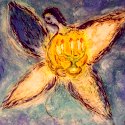
[ The eight-day Festival of Chanukah begins Saturday, Dec. 8th at sundown this year... ]
11.30.12 (Kislev 16, 5773) The Hebrew word for "darkness" (i.e., choshekh: חשֶׁךְ) can be rearranged to spell both the verb "to cringe" (i.e., kachash: כָּחַשׁ) and the verb "to forget" (i.e., shakhach: שָׁכַח). To forget the Word of God is to be surrounded by darkness, as it says, "For the commandment (מִצְוָה) is a lamp, and the Torah is light, and the reproofs of discipline are the way of life" (Prov. 6:23).
כִּי נֵר מִצְוָה וְתוֹרָה אוֹר
וְדֶרֶךְ חַיִּים תּוֹכְחוֹת מוּסָר
ki · ner · mitz·vah · ve·to·rah · ohr
ve·de·rekh · chai·yim · to·che·khot · mu·sar

"For the commandment is a lamp, and the Torah is light,
and the reproofs of discipline are the way of life."

Download Study Card
Yeshua is the Living Torah (תּוֹרַת חַיִּים) and its spiritual Light, for through Him we are able to see (John 8:12). The numeric value of the word "lights" (i.e., אורות) is 613, the traditional number of commandments enumerated in the written Torah. Yeshua is the inner light and meaning of all that the written Torah says; indeed, He is the goal (i.e., τέλος, "purpose" or "reason") of all that the Torah teaches and the means of attaining righteousness for all who trust in Him (Rom. 10:4).
It is clear from other Scriptures that we are not saved by means of law-keeping, of course, though on the other hand that does not excuse us from doing acts of righteousness. God did not "waste His breath" revealing the principles of righteousness to the Jewish people, and therefore we are to "study to show ourselves approved unto God" (2 Tim. 2:15). The "law of the Spirit of life in Yeshua" (תּוֹרַת רוּחַ הַחַיִּים בְּיֵשׁוּעַ) empowers to serve God according to a new principle of freedom. After all, true freedom doesn't mean doing "whatever you want," but rather means the power to choose contrary to the demands of your lower nature. We "put off" the old self and "put on" the new (Eph. 4:22-24). It is the divinely imparted "new nature" that gives us the power to "put to death" the old self by reckoning it crucified with Messiah (Gal. 2:19-20). Obedience to the Torah of Yeshua leads to further revelation, just as disobedience to it leads to further darkness (Matt. 13:12). Yeshua is only the "Author of Eternal Salvation" for those who heed and obey Him (Heb. 5:9). "If we live by the Spirit, let us also walk by the Spirit" (Gal. 5:25).
For the follower of Yeshua, much of this process is "unconscious," by which I mean that it happens as a result of God's grace (χάρις, a word related to χαρά, "joy") over time, and thereby we become God's witnesses... As we learn to see the beauty of God's Torah, we will spontaneously and joyfully seek to do those things that please our LORD and Master. As the Apostle John wrote: "For this is the love of God, that we keep his commandments. And his commandments are not burdensome (lit. "heavy," βαρύς) (1 John 5:3).
C.S. Lewis once wrote, "I believe in Christianity as I believe that the sun has risen: not only because I see it, but because by it I see everything else." As it is written in the Scriptures: "For with You is the fountain of life; in Your light do we see Light" (Psalm 36:9).
 |
Olam Katan - Small World

11.30.12 (Kislev 16, 5773) It is written, "My offering, my food for my food offerings, my pleasing aroma, you shall be careful to offer to me at its appointed time" (Num. 28:2). Food for God? What need has the LORD for food? But by this is meant "as you have done it to least of these my brethren, you have done it unto Me" (Matt. 25:40). The offerings you make to tzedakah (charity) constitute food presented before the secret place of God's altar...
God created Adam alone, as a solitary being, made in the divine image, to teach us that to destroy a single life is to destroy an entire world, and to sustain a single life is to sustain an entire world. Therefore everyone should say: 'For my sake the world was created' (Talmud). Each of us is olam katan (עולם קטן), a small world that represents the large world. Indeed, one righteous human being can sustain the entire world, as it is written (Prov. 10:25), "the righteous is the foundation of the world" (וְצַדִּיק יְסוֹד עוֹלָם).
Balance is of course required here. Each of us is olam katan, a small world, though, as Rabbi Noah of Lekhivitz once wisely said, "if we are small in our own eyes, we are indeed 'a world,' but if we are a 'world' in our own eyes, we are thereby made small." This thought obviously echoes Yeshua's teaching: "Whoever exalts himself will be humbled, and whoever humbles himself will be exalted" (Matt. 23:12).
גַּאֲוַת אָדָם תַּשְׁפִּילֶנּוּ
וּשְׁפַל־רוּחַ יִתְמךְ כָּבוֹד
ga·a·vat · a·dam · tash·pi·le·nu
u·she·fal · ru·ach · yit·mokh · ka·vod

"The proud will be humbled,
but the humble will be honored"
(Prov. 29:23)

Rabbi Akiva once said that the greatest principle of Torah is to love your neighbor as yourself (Lev. 19:18), though Ben Azzai said that even greater is the principle that God created man in His likeness (בִּדְמוּת), since then one cannot say, 'Since I despise myself I can despise another as well; since I curse myself, let the other be accursed as well.' Being made in God's likeness means how we regard ourselves and others will be the measure we regard God Himself (1 John 4:20). Therefore the first commandment is always, "I am the LORD thy God..." (Exod. 20:2), since apart from faith, there is no Torah of any kind.
Thankful for you...
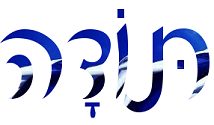
11.30.12 (Kislev 16, 5773) I want to express my heartfelt thanks to all my site visitors and faithful supporters. This ministry simply could not exist apart from your encouragement. Thank you so much... The LORD is good to those who hope (קוה) for Him, to the soul who searches (דָּרַשׁ) for him (Lam. 3:25). Blessed be the Name of the LORD forever.
אֲבָרֲכָה אֶת־יְהוָה בְּכָל־עֵת
תָּמִיד תְּהִלָּתוֹ בְּפִי
a·va·ra·kha · et · Adonai · be·khol · eit
ta·mid · te·hi·la·to · be·fi

"I will bless the LORD at all times;
his praise shall continually be in my mouth"
(Psalm 34:1)

Hebrew Study Card
Note: My mom has been in town visiting for the last few days, and it has been a great blessing to see her during this time. My family extends love and gratitude to you all.
Reconcilation and Atonement...
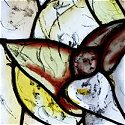
[ The following entry is related to this week's Torah reading (Vayishlach). Please read the Torah portion to "find your place" here. ]
11.29.12 (Kislev 15, 5773) When he was younger, Jacob was willing to deceive his own father and to "grapple" the advantage from his brother, but now he was a broken man who understood that he was entirely unworthy to receive God's blessing: "I am not worthy of the least of all the deeds of steadfast love (chesed) and all the faithfulness (emet) that you have shown to your servant, for with only my staff I crossed this Jordan, and now I have become two camps" (Gen. 32:10). In Torah scrolls, the Hebrew word katonti (קָטנְתִּי), translated as "I am unworthy," is written with a diminished Tet (ט) to indicate the humility of Jacob. Jacob no longer felt "entitled" to receive God's favor, though he was conscious of it nonetheless. He was now addressing his prayer to the LORD (יהוה) rather than to God (אֱלהִים), indicating that he first sought the compassion of God instead of God's justice....
Note: For more on this subject, see the article "Reconcilation and Atonement."
 |
The Importance of Chanukah

[ The eight-day Festival of Chanukah begins Saturday, Dec. 8th at sundown this year... ]
11.28.12 (Kislev 14, 5773) The Divine Light is associated with Torah and with learning, as it is written, "Your word is a lamp to my feet and a light to my path" (Psalm 119:105). Indeed, the word chanukah (חֲנֻכָּה) means "dedication," a word that shares the same root as the Hebrew the word chinukh (חִנּוּךְ), meaning "education." Just as the Maccabees fought and died for the sake of Torah truth, so we must wage war within ourselves and break the stronghold of apathy, indifference, and ignorance that the present world system engenders (Rom. 12:2; Eph. 6:11-18). We must make the time to educate ourselves by studying the Torah and New Testament, for by so doing we will be rededicated to the service of the truth and enabled to resist assimilation into the corrupt world. "Love not the world, neither the things that are in the world" (1 John 2:15).
We are all called to "fight the good fight of faith" and to take hold of the eternal life given to us in Yeshua our LORD (1 Tim. 6:12). Among other things this means refusing to assimilate with the corrupt world system (Κόσμος) and forfeiting our identity in Yeshua.... Chanukah is a "fighting holiday" -- a call to resist the oppression of this world and to rededicate our lives entirely to God.... Indeed, of all the people in the world, Christians who love Yeshua should should understand the true meaning of Chanukah and to rejoice that the Yeshua our Messiah overcame this world.
כָּךְ יָאֵר נָא אוֹרְכֶם לִפְנֵי בְּנֵי אָדָם
לְמַעַן יִרְאוּ אֶת מַעֲשֵׂיכֶם הַטּוֹבִים
וִיכַבְּדוּ אֶת־אֲבִיכֶם שֶׁבַּשָׁמָיִם
kakh · ya·er · na · o·re·khem · lif·nei · be·nei · a·dam
le·ma·an · yir·u · et · ma·a·se·khem · hat·to·vim
vi·kha·be·du · et · a·vi·khem · she·ba·sha·ma·yim

"Let your light so shine before men,
that they may see your good works,
and glorify your Father in heaven"
(Matt. 5:16)
Οὕτως λαμψάτω τὸ φῶς ὑμῶν ἔμπροσθεν τῶν ἀνθρώπων,
ὅπως ἴδωσιν ὑμῶν τὰ καλὰ ἔργα,
καὶ δοξάσωσιν τὸν πατέρα ὑμῶν τὸν ἐν τοῖς οὐρανοῖς

Note: It is somewhat ironic that the only reference to the Festival of Chanukah occurs in the New Testament, not in the Tanakh (i.e., the "Old Testament"). In the Gospel of John we read that Yeshua was at the Temple in Jerusalem during the "Feast of Dedication" (חַג חֲנוּכָּה), that is, Chanukah (John 10:22). During a season of remembering miracles (nissim), Yeshua pointed out that the works that He did attested to His claim to be the long-awaited Messiah of the Jewish people (John 10:37-38). His works and character clearly displayed the true Light of who He was, and these works still shine to us today. For more on this, see "Let your Light Shine: Why Christians Should Celebrate Chanukah."
God-Wrestling and Faith...

[ The following entry is related to this week's Torah reading (Vayishlach). Please read the Torah portion to "find your place" here. ]
11.28.12 (Kislev 14, 5773) Before he could return from his exile, Jacob had to face his fears and wrestle with God. The outcome of the struggle was a blessing, as signified by a new name, "Israel" (יִשְׂרָאֵל), meaning one who who perseveres (שָׂרָה) with God (אֵל). Jacob finally prevailed with God when the power of his faith overcame the pain of his past... His struggle is our own: to escape from our own exile we must likewise "wrestle" with what we will be called, with our new identity, so that we can be empowered to say from the heart: "I have seen God face to face, and yet my life has been delivered" (Gen. 32:30).
The prophet Hosea adds some further insight about Jacob's great struggle of faith and how it eventually led to the revelation of God at Bethel:
וָיָּשַׂר אֶל־מַלְאָךְ וַיֻּכָל בָּכָה וַיִּתְחַנֶּן־לוֹ
בֵּית־אֵל יִמְצָאֶנּוּ וְשָׁם יְדַבֵּר עִמָּנוּ
וַיהוָה אֱלהֵי הַצְּבָאוֹת יְהוָה זִכְרוֹ
vai·ya·sar · el · mal·akh · vai·yu·chal · ba·khah · vai·yit·cha·nen · lo
bet · el · yim·tza·e·nu · ve·sham · ye·da·ber · im·ma·nu
va·do·nai · E·lo·hei · ha·tze·va·ot · Adonai · zikh·ro

"Yes, he [Jacob] fought with the Angel and won; he wept and pled with Him.
He found Him at Bethel, and there He spoke with us;
even the LORD, the God of hosts; the LORD is His memorial."
(Hosea 12:4-5)

Jacob wept and made supplication to the Angel, a fact left unmentioned by Moses' account in the Torah, though perhaps hinted at in Jacob's prayer before the climactic conflict: "I am not worthy of the least of thy tender mercies..." (Gen. 32:10). This shows that the struggle was spiritual, not physical, and that Jacob finally "won" the fight by paradoxically submitting himself to God... The injured thigh was a token of Jacob's surrender to the Angel (Gen. 32:25, 31), and it was only after his flesh was wounded that Jacob's life was empowered by God to take hold of the realm of promise, as signified by his return to Bethel... Ultimately, Israel was wounded so that he could know that the LORD "gives power to the faint, and to them that have no might, he increases strength" (Isa. 40:29).
Notice that Jacob continued to wrestle until he was injured by the Angel of the LORD, after which he simply "hung on" for dear life until he received the blessing directly from God. In other words, Jacob discovered that struggling and resisting God were useless for the blessing to be secured, so he simply yielded in submission.... This was the turning point of his life, the moment when his new name and identity were bestowed. The LORD surely could have overpowered Jacob to submission, but it took far more for Jacob to freely surrender his will. In the end, the New Testament attests to change that issued from Jacob's brokenness: Despite some additional struggles he later faced with the flesh, he was finally able to die with the blessing of God to impart to his children (Heb. 11:21).
 |
I need Thee every hour...

11.27.12 (Kislev 13, 5773) "I need Thee every hour..." More than anything else, God's love is what we desperately need, isn't it? Especially in moments when we feel wounded, alone, unworthy, afraid, and needy; and even when we succumb to the depths of despair... God's love descends to the depths of our soul to hear our cries... Praise the Name of Love - despite everything, God saves us from ourselves, from our worst fears, and from the hell of shame and abandonment.
My soul yearns for you in the night; my spirit within me earnestly seeks you (Isa. 26:9). I say to the LORD, "You are my Lord; I have no good apart from you" (Psalm 16:2). O LORD, "whom have I in heaven but you? And there is nothing on earth that I desire besides you."
מִי־לִי בַשָּׁמָיִם
וְעִמְּךָ לא־חָפַצְתִּי בָאָרֶץ
mi · li · vash·sha·ma·yim
ve·im·me·kha · lo · cha·fatz·ti · va·a·retz

"Whom have I in heaven but you?
And there is nothing on earth that I desire besides you"
(Psalm 73:25)

Download Study Card
The ongoing need for the LORD is perhaps the highest estate of the human soul, even if it is nevertheless attended with heartsickness and unrelenting longing. It is a great, great gift from heaven to know God as your heart's true desire - to fully understand that your relationship with Him is the ultimate concern and treasure of your existence.
God's Steadfast Love...
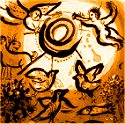
11.26.12 (Kislev 12, 5773) An old Jewish prayer says, "O Lord, I know that You will help us; but will you help us before you will help us?" Despite our lament, however, we refuse to let go, notwithstanding our ignorance, our complaint of heart, our doubts, fears, and so on... Dear Lord, in the worst of our moments, thank you for seeing the Savior within us; thank you for seeing the hope that the Spirit imparts....
כִּי יִתְחַמֵּץ לְבָבִי וְכִלְיוֹתַי אֶשְׁתּוֹנָן
וַאֲנִי־בַעַר וְלא אֵדָע בְּהֵמוֹת הָיִיתִי עִמָּךְ
וַאֲנִי תָמִיד עִמָּךְ אָחַזְתָּ בְּיַד־יְמִינִי
ki · yit·cha·metz · le·va·vi · ve·khil·yo·tai · esh·to·nan
va·a·ni · va·ar · ve·lo · e·da · be·he·mot · ha·yi·ti · i·makh
va·ani · ta·mid · i·makh · a·chaz·ta · be·yad · ye·mi·ni

"When my heart was embittered, when I was pierced in heart,
I was brutish and ignorant; I was like a beast toward you.
Nevertheless, I am continually with you; You hold my right hand."
(Psalm 73:21-23)

The heart of the psalmist was embittered or "soured" (literally "leavened" with chametz) over the thought that the wicked flourish in this world while the righteous often are afflicted and gravely suffer... Such (envious) thoughts hurt like a sword that penetrated the heart, "a shtuken nisht in hartz," in Yiddish. Note, however, that the pain came because the mind was focused on temporal things, and therefore the psalmist judged himself as being ignorant, "like a beast" that has no consciousness of eternity.
Despite the lament, however, the psalmist affirmed that he was always with God - despite his ignorance, his complaint of heart, his doubts, fears, and so on... He was not driven away by pain and confusion, but on the contrary, the LORD took him by the hand and would not let go: "It was I who taught Ephraim to walk; I took them up by their arms, but they did not know that I healed them" (Hos. 11:3).
"On Judgment Day, I like everyone else, will be allowed to hang all my unhappiness and suffering on a branch of the great Tree of Sorrows. Then, when I have found a limb from which my sorrows can dangle, I will walk slowly around that tree. Do you know what I will do on that walk? I will search for a set of sufferings I might prefer to those I have hung on the tree. But search as I may, I will not find any, and in the end, I will freely choose to reclaim my own personal set of sorrows rather than that of another. I will leave that tree wiser than when I got there, and I will be ready to walk toward the Tree of Life." (Hasidic Tales: Baal Shem Tov).
Again, dear Lord, in the worst of my moments, thank you for seeing the Savior within me; thank you for seeing the hope that the Spirit imparts....
The Sun of Righteousness...

11.26.12 (Kislev 12, 5773) "For behold, the Day is coming (הַיּוֹם בָּא), burning like an oven, when all the arrogant and all evildoers will be stubble. The Day that is coming shall set them ablaze, says the LORD of hosts, so that it will leave them neither root nor branch. But for you who fear my Name, the Sun of Righteousness (שֶׁמֶשׁ צְדָקָה) shall rise with healing in its wings. You shall go out skipping like calves released from the stall. And you shall tread down the wicked, for they will be ashes under the soles of your feet, on the day when I act, says the LORD of hosts" (Malachi 4:1-3).
וְזָרְחָה לָכֶם יִרְאֵי שְׁמִי שֶׁמֶשׁ צְדָקָה
וּמַרְפֵּא בִּכְנָפֶיהָ וִיצָאתֶם וּפִשְׁתֶּם כְּעֶגְלֵי מַרְבֵּק
ve·zar·e·chah · la·khem · yir·ei · she·mi · she·mesh · tze·da·kah
u·mar·pei · bikh·na·fe·ha · vitz·a·tem · u·fish·tem · ke·e·glei · mar·bek

"But for you who fear my Name, the Sun of Righteousness shall rise
with healing wings. You shall go out skipping like calves released from the stall"
(Malachi 4:2)

These awesome verses from Malachi primarily apply to the Second Coming of Yeshua as Mashiach ben David and the great "Day of the LORD" (יוֹם יהוה). The "Sun of Righteousness," shemesh tzaddik (שֶׁמֶשׁ צְדָקָה), refers to the Messiah, the risen life-giving Healer of God. Of Him it is said, "The LORD God is a sun and a shield" (Psalm 84:11) and "the LORD shall be to thee an everlasting Light (אוֹר עוֹלָם), and thy God thy glory; thy sun shall no more go down, for the Lord shall be thine everlasting light" (Isa. 60:19-20). The Divine Light will shine on those who receive God's righteousness, that is, on those who put their trust in the One who said, 'I am the Light of the world' (John 8:12).
The sages say, "in the world to come (עוֹלָם הַבָּא), God will bring the sun out of its sheath to burn the wicked; they will be judged by it, but the righteous will be healed by it' (Shemot Rabbah). Yeshua is compared to the "Sun" because as the Sun is the central luminous body of our world, so Yeshua is called the "Light of Life" (אוֹר הַחַיִּים). Yeshua is melech ha-kavod (מֶלֶךְ הַכָּבוֹד), "the King of Glory" -- and no one can stand before the blinding power of His countenance (Psalm 27:4; Rev. 1:8-19). His is the "Fountain of Light" for all of creation, the Source and End of all life: "For by Him all things were created, in heaven and on earth, visible and invisible, whether thrones or dominions or rulers or authorities -- all things were created through Him and for Him. And he is before all things, and in him all things hold together... that in everything He might be preeminent" (Col. 1:16-18). Yeshua will come "with healing in his wings" -- that is, in healing radiance, with rays and beams, which metaphorically describe His influence over the hearts of men... Note that the word for "wings" used in this passage (i.e., kanaf: כָּנָף) pictures the image of a heavenly tallit (טַלִּית), or the heavenly firmament (רָקִיעַ) of the LORD's sheltering Presence.
 |
Wrestling with the Angel

[ The following entry is related to this week's Torah reading (Vayishlach). Please read the Torah portion to "find your place" here. ]
11.25.12 (Kislev 11, 5773) Among other things, our Torah portion this week contains the story of how Jacob "wrestled" with the Angel of the LORD just before he encountered his estranged brother Esau. During the "grappling" session (recall the meaning of Jacob's name), the Angel injured Jacob's thigh, but Jacob refused to release his hold until he received the blessing (הַבְּרָכָה). The LORD then asked him, "What is your name (מַה־שְּׁמֶךָ)?" And he said, "Jacob" (i.e., Ya'akov: יַעֲקב). The Angel then replied, "Your name shall no longer be Ya'akov ("heel holder" [of Esau]) but Yisrael ("contender with God"), for as a prince (i.e., sar: שַׂר) you have contended (i.e., sarita: שָׂרִיתָ) with God and with men and have prevailed" (Gen. 32:28). Jacob finally prevailed with God when he refused to let his past determine his spiritual status and destiny... He overcome the pain and shame of his past through faith...
Similarly, each of us must "go to Peniel" to wrestle with the Angel; each of us must be renamed from Ya'akov ("a supplanter") to Israel ("a prince with God"). When the Spirit of Truth asks, "What is your name," may the LORD God grant you the courage to refuse to "let go" until you receive the divine blessing of love and acceptance...
Note: For more information, please read the Torah summary page for Vayishlach and its related articles. You can also download the Shabbat "Table Talk" for the portion here:
Deliverance from Our Fears...

11.23.12 (Kislev 9, 5773) One of our most basic fears is that we don't matter. We are desperately afraid of becoming invisible, unseen, unheard, unknown, and unrecognized; we dread that we will disappear like a passing shadow; we silently wonder how anyone could really care about us, because we secretly question whether we are worth caring about... Because of this private dread, we attempt to "find ourselves" in externals; we lust for trinkets and baubles in a pathetic attempt to assuage the emptiness we feel; we identify with various people whom we idolize; we worship sports teams or artists; we emulate our carnal heroes and crave to be popular, charming, strong, beautiful, etc. The greater the void we feel inside, the more we try to escape ourselves... The eye of faith, on the other hand, "looks not to the things that are seen but to the things that are unseen. For the things that are seen are transient, but the things that are unseen are eternal" (2 Cor. 4:18). Faith sees the hidden realm of the invisible (חַיֵּי עוֹלָם), the underlying foundation (ὑπόστασις) of things hoped for (Heb. 11:1), and thereby sets us free the slavery of fearful and fleeting shadows. Faith discerns the deeper person whom God created and redeemed for His glory...
אַל־תִּירָא כִּי עִמְּךָ־אָנִי אַל־תִּשְׁתָּע כִּי־אֲנִי אֱלהֶיךָ
אִמַּצְתִּיךָ אַף־עֲזַרְתִּיךָ אַף־תְּמַכְתִּיךָ בִּימִין צִדְקִי
al · ti·ra · ki · im·me·kha · a·ni · al · tish·ta · ki · a·ni · E·lo·he·kha
im·matz·ti·kha · af · a·zar·ti·kha · af · te·makh·ti·kha · bi·min · tzid·ki

"Fear not, for I am with you; be not dismayed, for I am your God;
I will strengthen you, I will help you,
I will uphold you with my righteous right hand."
(Isaiah 41:10)

Download Study Card
We are repeatedly commanded, al tirah, "be not afraid," because fear was the original sin of Eve in the garden, just as fear lies behind our own hiding and self-imposed exile from God... The "fall of mankind" was from faith to fear; therefore the way of healing is to refuse our shame by turning back to God in trust, from fear to faith. We can do this because of the cross of Yeshua our Lord... If we haven't accepted God's love and forgiveness, we are still slaves to fear, we are still living in the nightmare of this world and its shadowy illusions. God's love casts out fear because it casts out all our sins (1 John 4:18).
וַתִּתֶּן־לִי מָגֵן יִשְׁעֶךָ
וִימִינְךָ תִסְעָדֵנִי וְעַנְוַתְךָ תַרְבֵּנִי
va·tit·ten-li · ma·gen · yish·e·kha
vi·min·kha · tis·a·dei·ni · ve·an·va·te·kha · tar·bei·ni

"You have given me the shield of your salvation,
Your right hand supports me, and your condescension makes me great."
(Psalm 18:35)
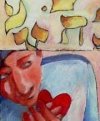
Worry is a place of exile and pain. Since God's Name YHVH (יהוה) means "Presence" and "Love," to be troubled or anxious is to practice the absence of God's presence instead of practicing His Presence... Where it is written, "cast all your anxiety on him because he cares for you" (1 Pet. 5:7), the word translated "anxiety" (μέριμνα) comes from a verb (μερίζω) that means to be fragmented or divided into parts and pieces. We bring our brokenness to God - including those distractions that tear us away from Him and that make us inwardly fragmented and afraid - in order to receive God's love and care for our lives...
Take comfort that your Heavenly Father sees when the sparrow falls; he arrays the flower in its hidden valley; and he calls each star by name. More importantly, the Lord sees you and understands your struggle with fear... Bring to Him your needy heart and trust in His provision and care... As we look to Him, we will be seen -- and our dread of being invisible, irrelevant, and insignificant will itself vanish.
How great is the LORD our God, who condescends to see us, to save us, to care for us all the days of our sojourning, and who gives us eternal life in Yeshua our Savior? Blessed is His name forever and ever. Shabbat Shalom, chaverim!
 |
Happy Thanksgiving...
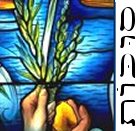
11.22.12 (Kislev 8, 5773) On this special day, let's remember to offer our thanks to God for His faithful love! "The faithful love of the LORD never ceases; his mercies never come to an end; they are new every morning; great is your faithfulness." Amen.
חַסְדֵי יְהוָה כִּי לא־תָמְנוּ
כִּי לא־כָלוּ רַחֲמָיו
חֲדָשִׁים לַבְּקָרִים
רַבָּה אֱמוּנָתֶךָ
chas·dei · Adonai · ki · lo-ta·me·nu
ki · lo-kha·lu · ra·cha·mav
cha·da·shim · la·be·ka·rim
rab·bah · e·mu·na·te·kha

"The faithful love (חֶסֶד) of the LORD never ceases;
his mercies (רַחֲמִים) never come to an end;
they are new every morning (חֲדָשִׁים לַבְּקָרִים);
great is your faithfulness (אֱמוּנָה)"
(Lam. 3:22-23)

Hebrew Study Card
Hodu Ladonai ki tov: "Give thanks to the Lord for he is good!" Happy Thanksgiving, friends.
Love and Self-Acceptance...

11.21.12 (Kislev 7, 5773) The one person we often find most difficult to accept is ourselves... We torment ourselves over the supposed need to be "perfect," even while fully knowing there is much in us that remains broken. We may compare ourselves to others, question our worth, and even deny ourselves the compassion that God freely offers. We say love is for other people, but not for us... Truly, however, it is better to humbly esteem ourselves as worthy in God's eyes than it is to degrade ourselves and live in the misery of self-hate and shame. Loving yourself requires having a "good eye" that is willing to see the good. In Hebrew, a "grudging eye" (ayin tzara) means refusing to see the bigger picture...
וְאָהַבְתָּ לְרֵעֲךָ כָּמוֹךָ
אֲנִי יְהוָה
ve·a·hav·ta · le·re·a·kha · ka·mo·kha
a·ni · Adonai

"You shall love your neighbor as yourself.
I am the LORD."
(Lev. 19:18)

Hebrew Study Card
The "bigger picture" is that we are all linked together as one, we are made one "body," and each of us contributes to the glory of the redeemed people of God (1 Cor. 12:14-26; Col. 3:15). Each of us individually refracts a portion of God's beauty and love like no one else can, but none of us can refract that glory without the others whom God likewise loves...
Johann von Goethe once said, "If you treat me as if I were what I ought to be and could be, I will become what I ought to be and could be." This applies to our self-talk, too: If you regard yourself as if you were what you ought to be and could be, then you will become what you ought to be an could be... We need to remind ourselves that we are indeed beloved and made truly worthy on account of Yeshua our Savior. Loving others (including yourself) requires using a "good eye," as opposed to a "grudging eye" that squints in criticism. In Hebrew, a "grudging eye" (ayin tzara) literally means using a "narrow look," that is, refusing to see the bigger picture. May the LORD God forgive us for our self-abuse...
The central commandment of Torah is "you shall love," but such love requires that we believe in the vindication of the good. Therefore refuse to accept the world's dark propaganda and dialectic; repudiate the temptation to embrace cynicism or despair. Don't let the devil and this world blacken your heart or cause your eye to squint at others (or yourself) in fear. The spirit of this world traffics in fear, hatred, and death, but we will overcome evil with good. Walk counterculturally, full of faith in the invisible hand of God. Love rules forever!
 |
Pray for the Jewish People...

11.21.12 (Kislev 7, 5773) In light of the recent acts of terrorism directed against the Jewish people in the land promised to them by the LORD God Almighty, please remember to "pray for the well-being of Jerusalem; may those who love you be at peace."
שַׁאֲלוּ שְׁלוֹם יְרוּשָׁלָםִ יִשְׁלָיוּ אהֲבָיִךְ
sha·a·lu · she·lom · ye·ru·sha·la·yim, · yish·la·yu · o·ha·va·yikh

"Pray for the well-being of Jerusalem;
May those who love you be at peace."
(Psalm 122:6)
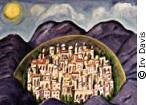
Download Study Card
In this connection, let me ask you a simple question. If the King of the Jews is our hope and lives inside our hearts by faith, and if he calls Jerusalem the "City of the great King" (Psalm 48:2, Matt. 5:35), then it only makes sense that we would heed the Scriptural admonition to "pray for the peace of Jerusalem," and to sincerely petition the Lord to bless and protect the Jewish people in general (Gen. 12:1-3).
May God vindicate Israel and always protect the Jewish people with His power...
Thanksgiving to God...

11.21.12 (Kislev 7, 5773) We give thanks to God because He has graciously given us salvation (יְשׁוּעָה) through His Son Yeshua: for His Name is near. The adverb "near" (i.e., karov: קָרְבָּן) means "close enough to touch," and indeed the noun form means "a near kinsman" (i.e., kinsman redeemer). Because of Yeshua, God Himself has become our "close relative." Confession (i.e., todah: תּוֹדָה) and trust (i.e., emunah: אֱמוּנָה) are central here. As it is written: "The word is very near you [כִּי־קָרוֹב אֵלֶיךָ הַדָּבָר מְאד] - as close as your mouth and your heart (Deut. 30:14). You must confess with your mouth and believe "in your heart" that God loves you with an "everlasting love." Whoever calls upon the Name of the LORD will not be disappointed (Joel 2:32; Acts 2:21; Rom. 10:9-13; Psalms 86:5; Rev. 3:20).
הוֹדִינוּ לְּךָ אֱלהִים הוֹדִינוּ וְקָרוֹב שְׁמֶךָ
סִפְּרוּ נִפְלְאוֹתֶיךָ׃
ho·di·nu · le·kha · E·lo·him · ho·di·nu · ve·ka·rov · she·me·kha,
sip·pe·ru · ni·fle·o·te·kha

"We give thanks to You, O God; we give thanks, for Your Name is near.
We recount your wondrous deeds" (Psalm 75:1)

Download Study Card
Note: The American holiday of Thanksgiving certainly has its roots in the Jewish tradition of giving thanks to God, and some historians believe that the early pilgrims derived the idea directly from the festival of Sukkot (i.e., "Tabernacles"). For more information, click here.
The Ladder of Sinai...

[ The following is related to this week's Torah reading, Parashat Vayetzei. Please read the Torah portion to "find your place" here. ]
11.20.12 (Kislev 6, 5773) The revelation at Sinai and Jacob's vision of the ladder share something in common. Just as Yeshua was the "Voice of the Living God (קוֹל אֱלהִים חַיִּים) speaking (davar) from the midst of the fire" at Sinai (Deut. 5:26), so He was the Ascended LORD standing above the ladder speaking the word of promise (Gen. 28:12-15). In this connection we note that the words for "ladder," (i.e., sullam: סֻלָּם), "voice" (i.e., kol: קל), and "Sinai" (סִינָי) have the same numerical value, which suggests a connection between the two great visions. Yeshua is the Ladder to God, the means by which the Living Torah both descends and ascends for the sake of our deliverance (John 1:51). The "ladder of Sinai" is not meant for us to ascend but rather is for the LORD our Savior to descend and ascend on our behalf. Yeshua is the way, the truth, and the life (הדֶּרֶךְ וְהָאֱמֶת וְהַחַיִּים): no one can draw near to the Heavenly Father apart from Him (John 14:6).
 |
Intimacy with the Lord...

11.20.12 (Kislev 6, 5773) The Scriptures state that the LORD desires to "cleave" to our hearts in a loving relationship. יֵשׁ אהֵב דָּבֵק מֵאָח -- yesh ohev davek me'ach -- "there is a lover who sticks (davek) closer than a brother" (Prov. 18:24). The Hebrew word translated "sticks" (דָּבֵק) comes from the Hebrew word davak (דבק), a word used elsewhere to describe how a man cleaves to his wife so that they become basar echad – "one flesh" (see Gen. 2:24). Davak is also related to the word for bodily joint (debek), suggesting that we are to stick as closely to the LORD as our bones stick to our skin (Job 19:20).
The idea of cleaving implies an intimate relationship, of course, a shared sense of "need" for one another. The Torah instructs us to "cleave" to the LORD in devotion: "You shall fear the LORD your God; you shall serve Him and cleave to Him (Deut. 10:20); "Be careful to do all this commandment that I command you to do, loving the LORD your God, walking in all his ways, and cleaving to him" (Deut. 11:22). The concept of "cleaving" or "holding fast" is called devakut (דְּבָקוּת) in Jewish tradition, a relationship Yeshua likened in various ways, including the connection between the vine and its branches, or our dependence on the life of Messiah for our spiritual sustenance (John 15:4; 6:56).
דָּבְקָה נַפְשִׁי אַחֲרֶיךָ
בִּי תָּמְכָה יְמִינֶךָ
da·ve·kah · naf·shi · a·cha·re·kha
bi · tam·khah · ye·mi·ne·kha

"My soul clings to you;
Your right hand upholds me."
(Psalm 63:8)

Hebrew Study Card
In Jewish mystical theology, devakut is considered as the highest step on the spiritual ladder back to God, somewhat similar to the idea of "beatific vision" found in some Christian traditions. Yeshua, however, emphasized that He alone is the true sullam, or Ladder, to God. Just as Jacob saw a ladder reaching to heaven with the angels of God ascending and descending upon it, so Yeshua is the Bridge, hasha'ar hashamayim - the gateway into heaven (Gen. 28:12, John 1:51, 14:6). Our Redeemer descended to earth by clothing himself in human flesh and walking in humility among us; indeed, He demonstrated God's own devakut for us by "cleaving" to the cross as full payment for our sin. Because of His faithful love for us, we can now experience "at-one-ment" and true communion with God (see John 17:21-23). Blessed be His Name forever.
The Mending of life...
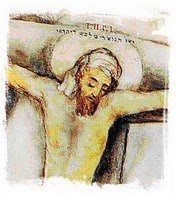
11.20.12 (Kislev 6, 5773) Do not be paralyzed with shame over your sins, but rather fight ceaselessly, bravely, and without hesitation, because the Kingdom of Heaven will indeed come. Focus on the meaning of your redemption: the cross of Messiah; understand your sin only in light of Yeshua and his glory. "False shame is the devil's favorite emotion; it is even worse than false pride. Pride can support evil, but false shame stops goodness" (John Ruskin). The best teshuvah (repentance) is to get up and act for righteousness, now, in this moment, and leave the mending of your past to God's love and care...
I do not see the road ahead of me, I cannot know for certain where it will end. Nor do I really know myself, and the fact that I think I am following your will does not mean I am actually doing so. But I believe the desire to please you does in fact please you, and I hope I have that desire in all that I am doing. I hope that I will never do anything apart from that desire. And I know that if I do this you will lead me by the right road, though I may know nothing about it. Therefore, I will trust you always, though I may seem to be lost and in the shadow of death. I will not fear, for you are ever with me, and you will never leave me to face my perils alone." (Thomas Merton)
טוֹב־וְיָשָׁר יְהוָה
עַל־כֵּן יוֹרֶה חַטָּאִים בַּדָּרֶךְ
tov · ve'ya·shar · Adonai
al-ken · yo·reh · cha·ta·'im · ba·da·rekh

"Good and upright is the LORD;
therefore he teaches sinners in the way."
(Psalm 25:8)
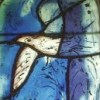
Hebrew Study Card
God's goodness seeks to justify the sinner, though his uprightness demands absolute justice. These are reconciled by means of the cross of Yeshua, where the sinner may return to God by means of teshuvah (Psalm 85:10). If an earnest sinner turns to the Lord, God will receive and teach him in the way of Yeshua, who is "the Way, the Truth, and the Life" of God's heart (John 14:6). Upon the first movement of teshuvah, judgment has been given, and therefore God looks upon the seeker with mercy and love. Faith affirms that inner and eternal healing is available for all those who desire it. God never leaves us to face our perils alone...
Mystery and Gratitude...

11.19.12 (Kislev 5, 5773) A sense of wonder and mystery is central to faith, since "the last step of human reason is the confession that there are an infinite number of things that are beyond it" (Pascal). Just as human reason ultimately points beyond itself, so faith points beyond itself to the Lord as the Source and the End of all mystery, beauty, goodness, love, and truth... The idea of mystery is not a confession of ignorance as much as it is an awareness of the inherent sanctity of life and of the ultimate triumph of love.... Faith believes that everything will ultimately be healed by God's overarching will, through which the universe is sustained and made intelligible to us. As it is written in the holy Scriptures: "The heavens declare the glory of God, and the sky above proclaims the work of His hands. Day after day it speaks out; night after night it reveals His greatness."
הַשָּׁמַיִם מְסַפְּרִים כְּבוֹד־אֵל
וּמַעֲשֵׂה יָדָיו מַגִּיד הָרָקִיעַ
יוֹם לְיוֹם יַבִּיעַ אמֶר
וְלַיְלָה לְּלַיְלָה יְחַוֶּה־דָּעַת
ha-sha·ma·yim · me·sa·pe·rim · ke·vod · El,
u·ma·a·seh · ya·dav · mag·gid · ha·ra·ki·a;
yom · le·yom · ya·bi·a · o·mer,
ve·lai·la · le·lai·la · ye·cha·veh · da·at

"The heavens recount the glory of God,
and the sky above proclaims the work of His hands.
Day after day it speaks out;
night after night it reveals His greatness."
(Psalm 19:1-2)

Download Study Card
Indeed, there are no inconsequential moments of life. Every thought, feeling, and decision we make is an irrepeatable venture. As it is written, "We live once, and then we face judgment" (Heb. 9:27). Wonder, significance, worth, value -- all come from seeing with a "good eye" (ayin tovah). It is faith that gives life to the understanding, not the other way around. Faith sees the miracle: "Let it be done for you as you have believed"(Matt. 8:13), and yet faith itself is poignant and often difficult in light of suffering (Mark 9:24). Life in olam hazeh (this world) is inherently paradoxical: Everything passes and everything matters; everything turns to dust and everything is of infinite value and importance. Faith is the "holy suspense" of love's great expectation...
"The deepest thing in our nature is this region of the heart in which we dwell alone with our willingness and unwillingness, our faith and our fear." - William James
We can only appreciate the gift of life in light of God and the message of eternity. Ironically, those who worship (i.e., absolutize) the world can neither truly love nor know it, since such a world literally does not exist -- it's an illusion, a vanity, a fiction of mind. The same is true of the inward "world" of the soul. Making the ego our ultimate concern invariably leads to self-destruction. It's only when we "give up the world" in the light of the redemptive love of Yeshua that we are able to find (εὑρίσκω) our souls (Matt. 16:25). Those who refuse to "pass through" this world - that is, those who absolutize their life here - ultimately find only disappointment. This world is not an adequate object of love; it is not a true home; it cannot fulfill the heart's need. Indeed, those who refuse to "give up the world" end up losing (ἀπόλλυμι) their own soul.
"All religious reality begins with what the Bible calls the 'fear of God.' It comes when our existence between birth and death becomes incomprehensible, when all security is shattered through the mystery. This is not the relative mystery of that which is inaccessible only to the present state of human knowledge and is hence in principle discoverable. It is the essential mystery, the inscrutableness of which belongs to its very nature..." (Martin Buber)
Maybe it's because I have been dealing with certain health problems recently, but I've become more and more conscious of the fragility and glory of life. Ha-kol oveir, chaverim - "everything passes." Each of us has the choice to graciously accept the inevitable passage of time or confront life with inner protest and despair. May the Lord help us walk through the remainder of our days with sincere gratitude and a holy sense of wonder over the gift of life; may He teach us to "number our days and apply our hearts to wisdom" (Psalm 90:12).
Grace and Inner Healing...

11.19.12 (Kislev 5, 5773) All of us have unhealed parts, those "hidden faults" of which we are not fully aware. Therefore King David petitioned, "Who can discern his errors? Cleanse me from secret faults; keep back your servant also from presumptuous sins; let them not have dominion over me" (Psalm 19:12-13). May it please the Lord to heal those parts of ourselves that don't even know they need to be healed... Amen.
שְׁגִיאוֹת מִי־יָבִין מִנִּסְתָּרוֹת נַקֵּנִי
גַּם מִזֵּדִים חֲשׂךְ עַבְדֶּךָ אַל־יִמְשְׁלוּ־בִי אָז אֵיתָם
וְנִקֵּיתִי מִפֶּשַׁע רָב
she·gi·ot · mi-ya·vin · min·nis·ta·rot · nak·kei·ni
gam · mi·ze·dim · cha·sokh · av·de·kha · al-yim·she·lu-vi · az · e·tam
ve·ni·ke·ti · mi·pe·sha · rav

"Who can discern his errors? Cleanse me from secret faults; Keep back your servant
also from presumptuous sins; let them not have dominion over me! Then I shall
be blameless, and innocent of great transgression." (Psalm 19:12-13)

Note that the Hebrew word translated "errors" (i.e., shegi'ot: שְׁגִיאוֹת) comes from a root word (שָׁגָה) that means to wander, stray, or transgress. The question raised by David is rhetorical: "Who can discern his errors?" No one – apart from divine intervention... David asked to be cleansed from his "secret faults," which are not those that were performed by him "in secret," but rather those that were unknown, unseen, and unconscious to his own sense of awareness. These are "mindless" sins, unthinking offenses, hidden dispositions, character traits and actions that a person unwittingly performs, perhaps because of deep forces of which he or she is oblivious. These are the "secret sins" set in the light of God's face (Psalm 90:8); the "sluggish darkness" of the human heart that leads to death and ruin: "The heart is deceitful above all things, and incurably sick; who can understand it?" (Jer. 17:9). How many of us, after all, are fully aware of what we are doing when we are doing something? How many of us are completely transparent both to ourselves and before God, with no unclear motives, etc.? We must always be vigilant... There is always the force of habit, or the subconscious desires or conflicts of the inner life, that work on us, not to mention the trauma of our past and the present devices from the enemy of our souls. May the LORD give us the willingness to be healed, even if there are parts of ourselves that seem to resist that healing.
Note also that "presumptuous" sins (מִזֵּדִים) are not necessarily flagrant sins as much as those that arise from self-reliance or pride (זָדוֹן). Only the humble of heart can be truly free from the dominance of sin. "Keep steady my steps according to your promise, and let no iniquity get dominion over me" (Psalm 119:133). May God make us humble of heart, free from presumption and the illusion that we do not need God for every step we take. And again, may it please the good Lord to heal those parts of ourselves that don't even know they need to be healed... Amen.
 |
Parashat Vayetzei - ויצא

[ The following is related to this week's Torah reading, Parashat Vayetzei. Please read the Torah portion to "find your place" here. ]
11.18.12 (Kislev 4, 5773) In last week's Torah portion (Toldot), Jacob "grappled" the blessing from his father Isaac, but it cost him dearly.... His brother Esau was so enraged by the betrayal that Jacob was forced to flee his parent's home in shame, never to see his mother again (indeed, Rebekah "lost both her sons in one day," just as she had feared [Gen. 27:45]). Jacob's 20 year exile from the family began in heartache and sorrow -- "fleeing as an outcast over stony lands" -- away from the love of his mother and devoid of the hope given to his father and grandfather...
As he fled to Haran, however, the sun began to set, and Jacob came to the "appointed place" (יִּפְגַּע בַּמָּקוֹם) before departing from the Promised Land. Wearied from the journey, Jacob devised a makeshift "bed" in the field, using a stone as a pillow, and dreamed of a great ladder (i.e., sullam: סֻלָּם) that was set up on earth and reached toward heaven with the angels of God ascending and descending upon it:
And behold, the LORD stood over him (נִצָּב עָלָיו) and said, "I am the LORD, the God of Abraham your father and the God of Isaac. The land on which you lie I will give to you and to your offspring. Your descendants shall be like the dust of the earth, and you shall spread abroad to the west and to the east and to the north and to the south, and in you and your descendants (lit., sing. "your seed": זַרְעֶךָ) shall all the families of the earth be blessed. Behold, I am with you and will keep you wherever you go, and will bring you back to this land. For I will not leave you until I have done what I have promised you" (Gen. 28:13-15).
When Jacob awoke he was overawed: "Surely the LORD is in this place (בַּמָּקוֹם הַזֶּה) and I knew it not." Shaken by the vision, he said, ein zeh ki im-bet Elohim v'zeh sha'ar ha-shamayim (שַׁעַר הַשָּׁמָיִם): "This is none other than the house of God - and this is the gate of heaven" (Gen. 28:17). Jacob then made a monument from the stone he had used as a pillow, anointed it with oil, and called the place Bet-El (בֵּית־אֵל) - "the house of God." It is possible that this was the place that Abraham erected an altar to the LORD after he came to the Promised Land (Gen. 12:8).
Our Savior Yeshua later referred to Jacob's dream when he said, "Truly, truly, I say to you, you will see heaven opened, and the angels of God ascending and descending on the Son of Man" (John 1:51). Just as Jacob saw the ladder ascending to heaven with the angels of God ascending and descending upon it, so Yeshua is the Ladder to God, the true sha'ar ha-shamayim (שַׁעַר הַשָּׁמָיִם) - the way into heaven (John 14:6). Indeed, Yeshua is the true Temple or "house of God" (i.e., Bethel: בֵּית־אֵל) and its Chief Cornerstone (i.e., Rosh Pinnah, Matt. 21:42). He is the divine communication (Word) from heaven to earth -- the very Angel of the LORD who descends and ascends for the sake of our salvation.
The gematria (numerical value) of the Hebrew word for "ladder" (i.e., sullam: סֻלָּם) and the Hebrew word for "voice" (i.e., kol: קל) are identical (i.e., 130). From this we learn that just as the ladder symbolized the will of God being manifest and accomplished "on earth and it is in heaven," so the Voice or Word of God was manifest in order to connect us to heaven. Yeshua is our Bridge, the Life by which we are connected and called up to the Eternal. Indeed, the "katan" method of gematria for sullam is 13, the same as the Name YHVH.
Note: For more information, please read the Torah summary page for Vayetzei and its related articles. You can also download the Shabbat "Table Talk" for the portion here:
Let your light shine...
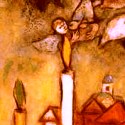
11.16.12 (Kislev 2, 5773) Your faith must mean something to you if it is to mean anything before God... As Abraham Heschel once said, "God is of no importance unless He is of supreme importance." Likewise John Ruskin noted that "those who give second place to God in their hearts do not give him a place at all." Feckless prayers or empty rituals are useless before the LORD, since God wants your whole life, your whole heart (Deut. 18:13). "Deep calleth unto deep." In order to draw close to the LORD, you must really want Him. If you are stuck there, ask Him to reveal more of His beauty and glory to you...
If you are feel empty, remember that faith apart from works is "dead," being alone (James 2:26). Make haste to act on God's promises and perform ma'asim tovim (מַעֲשִׂים טוֹבִים), "good works." Give tzedakah, call or visit a sick friend, bear the burdens of others. Faith is not a static thing; it is to be lived, acted upon, consciously chosen and "walked out."
Of course studying Scripture is the means by which the water of the Word pours into our lives for blessing and growth, so add Bible Study to the list of ma'asim tovim! It is often a struggle to do this, however, since the devil invariably will tempt you to think it is not really important for your well-being and life... Remember: the Word of God is our life! We live by every word that comes from the mouth of God (Deut. 8:3; Matt. 4:4).
However study by itself is insufficient, since our faith is to make traction with the world of everydayness: "The world stands on three things: Torah study, service, and acts of chesed [loving kindness]" (Avot 1:2), and therefore we must be careful to practice our faith by serving others and performing acts of love... "Let not your wisdom exceed your deeds lest you be like a tree with many branches but few fruits" (Mark 11:13-14).
Always focus on Yeshua, the Living Torah and the true Wisdom of God: "Whoever has my commandments (מִצְוֹתַי) and keeps them, that is the one who loves me. And the one who loves me will be loved by my Father, and I will love him and will manifest (lit., "shine within" from ἐν, "in" + φαίνω, "shine") myself to him" (John 14:21). Whoever honors the Son is honoring the Father, since the LORD our God is forever One (John 5:23).
Shabbat Shalom, dear friends of the Messiah... When the LORD our God said, "Let there be light" (Gen. 1:3), He put on radiance as a robe of Divine Majesty and Kingship; He wrapped Himself in glory like a tallit gadol: "Bless the LORD, O my soul! O LORD my God, you are very great! You are clothed with splendor and majesty, covering yourself with light as with a garment, stretching out the heavens like a curtain."
בָּרֲכִי נַפְשִׁי אֶת־יְהוָה
יְהוָה אֱלהַי גָּדַלְתָּ מְּאד
הוֹד וְהָדָר לָבָשְׁתָּ
עטֶה־אוֹר כַּשַּׂלְמָה
נוֹטֶה שָׁמַיִם כַּיְרִיעָה
ba·ra·khi · naf·shi · et · Adonai
Adonai · E·lo·hai · ga·dal·ta · me·od
hod · ve·ha·dar · la·vash·ta;
o·teh · ohr · ka·sal·mah
no·teh · sha·ma·yim · ka·ye·ri·ah

"Bless the LORD, O my soul!
O LORD my God, you are very great!
You are clothed with splendor and majesty,
covering yourself with light as with a garment,
stretching out the heavens like a curtain."
(Psalm 104:1-2)

Hebrew Study Card
The whole earth is lit up with God's radiant glory, and every bush of the field is aflame before us -- if we have eyes to see (Isa. 6:3). May it please the LORD to open our spiritual eyes so that we can behold more of His glory and majesty in this hour... Stay strong and be of good courage, chaverim. You are loved and appreciated. Amen.
The Alembic of Faith...

11.16.12 (Kislev 2, 5773) Brokenness distills the intentions of the heart by helping us to be more honest with ourselves. We begin to realize that we are more vulnerable than at first we thought; that our faith is not as strong as we imagined, and that our motives are often mixed and unconscious. Illusions are striped away; idols crumble; deeper levels of selfishness are uncovered; the gap between our words and our deeds is exposed... It is one thing, after all, to intellectually think about faith or to idealize spirituality, but it is quite another to walk out faith in darkness. Yet it is only there, in the rawness of heart, that we discover what we really believe and how our faith makes traction with reality...
Thank God for Yeshua, who is always with us and who lightens our darkness... Amen.
Note: Beware of pious frauds who appeal to your carnal desire as the best reason for following the Lord. Test the spirits. "For the gate is narrow and the way is hard (i.e., τεθλιμμένη, "oppressive") that leads to life, and those who find it are few" (Matt. 7:14). Indeed, Yeshua often intentionally offended people when they encountered him. Far from making it easy to believe, he regularly put up stumbling blocks to reveal the heart's true motive... Anthony De Mello tells the following story: "Said a preacher to a friend: 'We have just had the greatest revival our church has experienced in many years!' 'How many did you add to your church membership?' 'None. We lost 500.' The point is that the heart of faith continues to say "Amen" even in tough times...
 |
A Future and a Hope...

11.16.12 (Kislev 2, 5773) We have to make peace with God, and that means letting go of our fear, hurt, anger, and fully surrendering ourselves to His will... We have to repent of our pride, "forgive" God, and firmly resolve to trust his heart. Test yourself: Do you really believe that God works all things for good in your life, or is this an empty profession that lacks genuine substance of heart? Are you willing to let God do what He wants in your life, even if you do not like or understand it?
It's been said that the will of God will never lead us to a place where the love of God will not keep us.... Indeed the very Name of the LORD (יהוה) means "Presence" (Exod. 3:14) and "Compassion" (Exod. 34:6-7). Yeshua said, "I go to prepare a place for you," which means that his love and presence are waiting for you in whatever lies ahead. Heed the message of the Holy Spirit: "For I know the plans I have for you, declares the LORD, plans for healing peace and not for evil, to give you a future and a hope (Jer. 29:11).
"Bless the LORD, O my soul, and all that is within me, bless his holy Name. Bless the LORD, O my soul, and forget not all his benefits: He forgives all your iniquity; He heals all your diseases; He redeems your life from the pit; He crowns you with steadfast love and mercy; He satisfies you with good so that your youth is renewed like the eagle" (Psalm 103:1-5).
 |
He will never leave you...
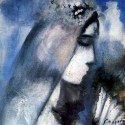
11.15.12 (Kislev 1, 5773) The Scriptures declare that though the "outward self" (ὁ ἔξω ἡμῶν ἄνθρωπος) inevitably wastes away (διαφθείρω), the "inner self" (ὁ ἔσω ἡμῶν) is being renewed (ἀνακαινόω, i.e., "raised up in newness of life") day by day (2 Cor. 4:16), which implies that we have nothing to fear regarding our perpetuity and acceptance as God's beloved children. Therefore we do not "lose heart" (lit., act badly, from ἐκ, "out" + κακός, "badly"). Despite the shadows of this world, we take hold of the words of our Savior, who said: "I give you eternal life, and you will never be destroyed (ἀπόλλυμι), and no one will snatch you out of my hand" (John 10:28). And in another place he likewise said, "Everyone who lives and believes in me shall never die (οὐ μὴ ἀποθάνη)" (John 11:26).
אַל־תִּירָא כִּי גְאַלְתִּיךָ
קָרָאתִי בְשִׁמְךָ לִי־אָתָּה
כִּי־תַעֲבר בַּמַּיִם אִתְּךָ־אָנִי
וּבַנְּהָרוֹת לא יִשְׁטְפוּךָ
כִּי־תֵלֵךְ בְּמוֹ־אֵשׁ לא תִכָּוֶה
וְלֶהָבָה לא תִבְעַר־בָּךְ
al-ti·rah · ki · ge·al·ti·kha
ka·ra·ti · be·shim·kha · li · at·tah
ki · ta·a·vor · ba·ma·yim · it·kha · a·ni
u·va·ne·ha·rot · lo · yish·te·fu·kha
ki-te·lekh · be·mo · esh · lo · tik·ka·veh
ve·le·ha·vah · lo · tiv·ar-bakh

"Fear not, for I have redeemed you;
I have called you by name, you are mine.
When you pass through the waters, I will be with you;
and through the rivers, they shall not overwhelm you;
when you walk through fire you shall not be burned,
and the flame shall not consume you."
(Isaiah 43:1-2)

God has redeemed you, friend, and has called you by name; he knows you intimately, and you belong to Him. God does not call groups, but rather individuals. The Spirit calls out, "follow me..." The Lord never leaves nor forsakes those who trust in Him, even if they should face waters that seem to overwhelm or fires that seem to devour and consume...
Personal Prayer Request: Dear friends of this ministry, please keep me (John) in your prayers, as I have been in the fire of testing for the last few months, though recently I have been sorely afflicted and in a various states of physical pain. I have had some CAT scans and other tests, and there are some concerns. Please ask the Lord for healing grace during this time, chaverim. Thank you...
Overcoming Oppression...

11.15.12 (Kislev 1, 5773) Yeshua proclaimed before Israel: "The Spirit of the Lord GOD is upon me, for the LORD has anointed me (i.e., mashach: מָשַׁח) to bring good news to the poor; he has sent me to bind up the brokenhearted (נִשְׁבְּרֵי־לֵב), to proclaim liberty to the captives, and the opening of the prison to those who are bound" (Isa. 61:1, Luke 4:18-19). The good news is proclaimed "to the poor" (Matt. 11:5) - not to the world at large, nor to those who are at home in this age... The Spirit of the LORD God brings good tidings to the afflicted ones; the Spirit binds up the brokenhearted and proclaims liberty to the captives:
רוּחַ אֲדנָי יְהוִה עָלָי
יַעַן מָשַׁח יְהוָה אתִי לְבַשֵּׂר עֲנָוִים
שְׁלָחַנִי לַחֲבשׁ לְנִשְׁבְּרֵי־לֵב
לִקְרא לִשְׁבוּיִם דְּרוֹר
וְלַאֲסוּרִים פְּקַח־קוֹחַ
ru·ach · Adonai · E·lo·him · a·lai
ya·an · ma·shach · Adonai · o·ti · le·va·ser · a·na·vim
she·la·cha·ni · la·cha·vosh · le·nish·be·rei · lev
lik·ro · lish·vu·rim · de·ror
ve·la·a·su·rim · pe·kach · ko·ach

"The Spirit of the Lord GOD is upon me,
for the LORD has anointed me to bring good news to the poor;
he has sent me to bind up the brokenhearted,
to proclaim liberty to the captives,
and the opening of the prison to those who are bound"
(Isaiah 61:1)

The poor (i.e., anavim: עֲנָוִים) are the meek, the lowly, the afflicted, the needy, and so on. The Hebrew word anavah (עֲנָוָה) means "humility," suggesting inner poverty, bankruptcy, brokenness, and hardship. The primary meaning of the root (עָנָה) is "to force, " or "to try to force submission," "to punish or inflict pain upon," or "to oppress."
The Messiah was sent to bind up the wounds of the brokenhearted. The Hebrew verb chavash (חָבַשׁ), "to bind up," can also mean to govern or to restrain... The LORD is near to the nishbar lev, the one with a broken heart. He restrains its woundedness and salves its hurt. The Hebrew word "lev" (לב) metaphorically refers to our inner life, that is, our affections, mind, and will. This is revealed in the letters of the Hebrew word itself: the Lamed (ל) depicts a "staff" used to direct something (i.e., the will), and the Bet (בּ) depicts the "house" of the physical body. Lev then represents our inner life of thought and feeling expressed in our actions. Those who are broken in heart – the nishberei lev – have discovered that they cannot control their own lives, that they are inwardly "shattered," and therefore need divine help. Yeshua comes to those truly humbled by their sin; to those cut to the heart, to those who have bruised and wounded spirits and who live in great pain. It is for these the Savior rises to bring comfort.
Healing ultimately leads to deliverance, and therefore the LORD proclaims liberty (דְּרוֹר) to the captives and sets the prisoner free... The Hebrew word denotes the straight, swift flight of a swallow, hence freedom of movement, freedom from tzarah, constriction, compression, bondage. The word "liberty" here recalls the great Yovel, or year of Jubilee, when captives were set free and inheritances were restored (Lev. 25:10). The Hebrew phrase pekach-koach (פְּקַח־קוֹחַ) means not merely the opening of prisons but universal liberty, complete and perfect redemption. Some scholars believe that the phrase refers to "the most complete opening," namely, the opening of the eyes of the blind, and this seems to be the way the New Testament refers to it (Luke 4:18).
It is worth noting that Yeshua quoted from Isaiah 61:1-2 when He read the haftarah at synagogue (Luke 4:17-20), though He stopped halfway after he read "to proclaim the year of the LORD's favor," and did not go on to finish the verse, "and the day of vengeance of our God, to comfort all who mourn; to grant to those who mourn in Zion-- to give them a beautiful headdress instead of ashes, the oil of gladness instead of mourning, the garment of praise instead of a faint spirit; that they may be called oaks of righteousness, the planting of the LORD, that he may be glorified" (Isa. 61:2-3). He stopped short because His ministry as Mashiach ben Yosef centered on proclaiming the year of the Lord's favor (שְׁנַת־רָצוֹן) as our Savior and Redeemer, rather than His ministry as Mashiach ben David who will first herald the Day of the Vengeance of our God (יוֹם נָקָם לֵאלהֵינוּ) at the End of Days and then establish the kingdom of Zion upon the earth.
It needs to be stressed, however, that the Day of Vengeance, the great Day of the LORD (יוֹם־יְהוָה), is fast approaching, chaverim. "The great day of the LORD is near, near and hastening fast" (Zech. 1:14). Let us be ready to meet our King!
Meanwhile we can apply the kingdom principles to our lives here in the "already-not-yet" time of faith in this age... Of interest is the phrase "beauty for ashes," פְּאֵר תַּחַת אֵפֶר, pe'er tachat efer, found in Isaiah 61:3. The word translated 'beauty' (i.e., pe'er: פְּאֵר) can mean a "headdress," or turban, but since it shares the same root as the word for "beauty" (i.e., tifarah: תִּפְאָרָה), it is perhaps better translated as "tiara," "crown," or "diadem." This pictures the Lord removing the ashes on the head of those who grieve with a beautiful crown of joy and life. Similarly, the "oil of joy" (i.e., shemen sasson: שֶׁמֶן שָׂשׂוֹן) contrasts with the austerity associated with mourning practices, and the "garment of praise" (i.e., ma'ateh tehilah: מַעֲטֵה תְהִלָּה) is given to replace the spirit of weakness and heaviness (i.e., ruach kehah: רוּחַ כֵּהָה) that characterizes times of grieving and helplessness...
The spirit of heaviness and oppression is a device of Satan to discourage the people of God by making them feel powerless, downcast, oppressed, inconsolable, condemned, and so on. By faith we "wrap ourselves" with praise as a way to fight spiritual oppression. When you feel oppressed by Satan, or when you sense a spirit of heaviness that inspires you to fear or despair, then offer focused praise to the LORD your God, the Holy One of Israel, who is enthroned on the praises of his people. Your praise will serve both to glorify the LORD and to vex the oppressor of your soul... Exalt the LORD your God; He is your praise; He is your God; He is the one who has done great things for you. "Holy, holy, holy, is the Lord God Almighty, who was and is and is to come!"
"Blessed is God who gives us the victory [over the devices of satan] through our Lord Yeshua the Messiah" (1 Cor. 15:57). When you are feeling downcast, look up and offer praise to God who heals you!
 |
Courage and Suffering...

11.14.12 (Cheshvan 29, 5773) How we deal with suffering makes all the difference. To paraphrase Kierkegaard, the way is how more than it is what. You may be powerless to control reality, but you are nevertheless responsible for how you respond to it.... Will you chose to lament a healing that has not yet happened, or perhaps turn bitter and regard yourself as a hapless victim? Or will you attempt to justify your suffering as a means of personal atonement, accepting it passively as a "good child" or martyr? Does your suffering stretch your heart, or does it cause you to shrink back in fear or self-pity?
Will you allow suffering to open your heart and change your expectations about what is really important - or will you stubbornly demand that life conform to your own desires, thereby inviting bitter disappointment over inevitable loss? Will you accept what comes or will you inwardly protest and lament your fate? Sooner or later everyone faces testing in life, but the question is whether we will regard it as an opportunity to exercise courage, or as an excuse to withdraw into sullen bitterness... Do you regard the wound as incurable or will you allow yourself hope to be healed? Indeed, "do you want to be healed?" (John 5:6).
We have to use ayin tovah, "a good eye," when we encounter the inevitable adversities of life. Instead of seeing ourselves as victims of undeserved trouble, and instead of harboring resentment over the past and entertaining fear of the future, we must learn to see adversity in the light of faith that teaches lessons about finding resilience and hope. Faith affirms that adversity has an end that is ultimately good.
It's been said, "hurt people hurt people," which means that if healing is not found for our woundedness, our pain will likely leak out as hostility toward others... Finding inner peace is therefore crucial lest we become poisoned through a "root of bitterness" that defiles many (Heb. 12:15). The worst sort of prison is the one we make for ourselves, by choosing to be taken captive by fear and anger.
If suffering is regarded as an enemy, then you can disarm its power by blessing God for it (Rom. 21:21). When we accept suffering as an occasion to give glory to God in the darkness, we overthrow the device of Satan that tempts you to blame fate or indulge in self-pity. In the presence of pain Satan whispers, "Curse God and die," but the heart of faith refuses to be rendered a victim. Bless your suffering; "in everything give thanks" (1 Thess. 5:18; Col. 3:17; Eph. 5:20). The heart of faith prophetically foresees: "Behold, it was for my healing (shalom) that I had great bitterness; but in love you have delivered my life from the pit of destruction, for you have cast all my sins behind your back" (Isa. 38:17):
הִנֵּה לְשָׁלוֹם מַר־לִי מָר
וְאַתָּה חָשַׁקְתָּ נַפְשִׁי מִשַּׁחַת בְּלִי
כִּי הִשְׁלַכְתָּ אַחֲרֵי גֵוְךָ כָּל־חֲטָאָי
hi·nei · le·sha·lom · mar · li · mar
ve·at·tah · cha·shak·ta · naf·shi · mi·sha·chat · be·li
ki · hish·lakh·ta · a·cha·rei · gev·kha · kol · cha·ta·ai

"Behold, it was for my healing that I had great bitterness;
but You in love have delivered my life from the pit of destruction,
for you have cast all my sins behind your back."
(Isa. 38:17)

Yeshua did not call us to join a "cult of sorrow and suffering," indulging in suffering as if such were a token of godliness and piety. Christian spirituality is not masochistic. We do not flagellate ourselves or crucify ourselves, but rely on the miracle of God. Yes, it is true that Yeshua wept, that he was angry over the hardness of men's hearts, and that he cried out in agony at the cross, but he also healed the sick, he forgave sins, he comforted others, and he always rejoiced in His father's love. And though he laid down his life at the cross, he was not a victim but willingly faced death with great nobility, courage, and grace (John 10:17-18; 18:37). Where it is written of the agony of Messiah on the cross, "My bones are out of joint, my hands are pierced... etc. (Psalm 22), we also read, "You made me safe at my mother's breasts." Even in the thrones of his agony, Yeshua recalled God's goodness and love.
We may tend regard the sacrifice of Messiah at the cross in terms of abuse, that is, by His willingness to suffer the worst kind of cruelty that men and devils can bestow, as if such passive suffering of Yeshua redeems, or "pays for" our sins. However, an alternative way of understanding the work of the cross is to regard it as the courageous triumph of God's love over the power of sin -- a triumph that foreshadowed the glory of resurrection itself... Yeshua unflinchingly faced suffering and death with nobility and courage because he was grounded in the Divine Presence that is the far greater power. His love overcame death just as light overcomes the darkness. To paraphrase Robert Morris on this idea: "The wounds of Yeshua are not signs that suffering is good, but are signs that you are worth suffering for; they are the wounds of a brave warrior bloodied in the fight to free your soul" (Suffering and the Courage of God). The blood of Yeshua cleanses us from sin because it represents the passion of God's heart for you... It is the expression of God's "at-one-ment" with you.
The goodness of God is the basis for finding courage to face adversity and suffering. We have to learn to trust God's love in the darkness, in the pain, and in the seemingly forsaken places... Exercising courage means caring enough to resist the temptation to despair, to abandon hope, to relinquish the hope that God's love is stronger than even death itself. May the loving Lord give you comfort now, chaverim...
כִּי־אַתָּה אֲדנָי טוֹב וְסַלָּח
וְרַב־חֶסֶד לְכָל־קרְאֶיךָ
ki · at·tah · Adonai · tov · ve·sa·lach
ve·rav · che·sed · le·khol · kor·e·kha

"For you, O Lord, are good and forgiving,
abounding in steadfast love to all who call upon you."
(Psalm 86:5)

Hebrew Study Card
Freedom and Forgiveness...

11.14.12 (Cheshvan 29, 5773) "Forgive and you shall be forgiven" (Matt. 6:14; Luke 6:37). Forgiveness is not optional for us. Clinging to hurt or resentment is to imprison yourself, to live in the inner hell of being a perpetual victim. No matter how valid your reasons for resentment might be, so long as you hold on to hurt and anger you are made a slave... "Bless those who curse you" means rising above the pain of the past and taking hold of your worth and identity as a beloved child of God. We must forsake the temptation to regard ourselves as helpless victims; we give up the sickness of our bitterness...
כִּי־עִמְּךָ הַסְּלִיחָה לְמַעַן תִּוָּרֵא
ki · im·me·kha · ha·se·li·chah · le·ma'an · tiv·va·rei

"But with You there is forgiveness,
that You may be held in awe" (Psalm 130:4)

"If you, O LORD, should mark iniquities, O Lord, who could stand? But with you there is forgiveness, that You may be held in awe" (Psalm 130:3-4). Forgiveness is only experienced "with God," and therefore we cannot hold God in awe, we cannot understand His compassion, we cannot know His heart, if we do not exemplify these qualities in our own inner life. Your forgiveness of others (including yourself) is a measure of your own forgiveness. Paradoxically, when you cling to woundedness, you refuse to be broken. The worst exile is the exile from peace of heart and mind...
Rosh Chodesh Kislev...

[ Note that the month of Kislev begins Wednesday, Nov. 14th at sundown this year... ]
11.13.12 (Cheshvan 28, 5773) Rosh Chodesh marks the start of a new month in the Jewish calendar. The Jewish sages metaphorically considered the lunar cycle to be a picture of ongoing "sacrifice and restoration." The renewal of the moon (i.e., the first crescent) was regarded as a kind of "rebirth" that issued from the previous service of the month (i.e., the moon's "self-diminution," or waning to complete darkness). On the Biblical calendar the month of Kislev (כִּסְלֵו) is the ninth month of the year (counting from the first month of Nisan), which this year begins Wednesday, Nov. 14th (after sundown).
The month of Kislev is one of the "darkest" months of the year, with the days progressively getting shorter and the nights getting longer. Indeed, the Winter Solstice often occurs during the last week of Kislev, and therefore the week of Chanukah (which straddles the months of Kislev and Tevet) often contains the longest night of the year. It is no wonder that, among other things, Chanukah represents an appropriate time to kindle the lights of faith - and to remember the Light of the World in the Messiah's advent to earth...
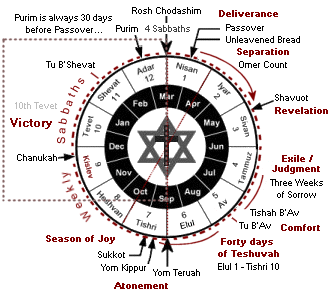 |
A Month of Dreams
The month of Kislev is sometimes called the "month of dreams" because the weekly Torah portions for this month contain more dreams than any other. No less than nine dreams (of the ten in the Torah) appear in the four portions of Vayetzei, Vayeshev, and Miketz - which are all read during the month of Kislev. In the Torah, the primary figure connected with dreams is Jacob's son Joseph, who was nicknamed by his brothers as "that dreamer" and who was later named "Decipherer of Secrets" (Tzofnat Paneach) by Pharaoh (Gen. 41:45). Joseph was able to mediate the spiritual and the physical realms through the Spirit of God within him (Gen. 41:38). Prophetically Joseph represents Yeshua the "disguised Egyptian" who likewise was rejected and hated by his brothers - but who later became their savior (for more on this, see "Mashiach ben Yosef").

A Month of Hope
Some of the sages say the name Kislev comes from a root (כּסל) that means "trust" or "hope." In the Torah the root appears in several places, including: "And they placed in God their hope (כִּסְלָם)" (Psalm 78:7); and, "Did I place my hope (כִּסְלִי) in gold?" (Job 31:24). Interestingly, the root can also refer to foolishness, suggesting that the wisdom of God (i.e., His "dream" for saving humanity through Yeshua) often appears as foolishness before men (1 Cor. 3:19). If Yeshua was born during Sukkot (i.e., Tabernacles), then it's likely that He was conceived during Chanukah - perhaps near the Winter Solstice itself. The true Light of the World would then overcome the darkest night of this world (John 1:9; 1 John 2:8).
The Month of Chanukah
This year the month of Kislev will begin Wednesday, November 14th after sundown, which means that the eight-day festival of Chanukah will begin on Saturday, December 8th at sundown (1st candle) and will run through Saturday, December 15th.
Rosh Chodesh Blessing
The following (simplified) blessing can be recited to ask the LORD to help you for the coming new month of Kislev:
יְהִי רָצוֹן מִלְּפָנֵיךָ יהוה אֱלהֵינוּ וֵאלהֵי אֲבוֹתֵינוּ
שֶׁתְּחַדֵּשׁ עָלֵינוּ חדֶשׁ טוֹב בַּאֲדנֵינוּ יֵשׁוּעַ הַמָּשִׁיחַ אָמֵן
ye·hi · ra·tzon · mil·fa·ne·kha · Adonai · E·lo·hei·nu · ve·lo·hei · a·vo·tei·nu
she·te·cha·desh · a·lei·nu · cho·desh · tov · ba'a·do·nei·nu · Ye·shu·a · ha·ma·shi·ach · A·men

"May it be Your will, LORD our God and God of our fathers,
that you renew for us a good month in our Lord Yeshua the Messiah. Amen."

Download Study Card
Chodesh Tov to you all, chaverim. Remember that the Divine Light shines like a fire and yet does not destroy or consume. The light of God does not necessarily take away the darkness but always overcomes it and shines within it: "The darkness and the light are both alike unto Thee" (Psalm 139:12; John 1:5). May this month be one of blessing and the Presence of the Divine Light of Yeshua within your hearts (John 8:12).
Deliverance from Fear...
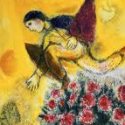
11.13.12 (Cheshvan 28, 5773) It is written, "God has not given us the spirit of fear, but of power (גְּבוּרָה / δύναμις) and of love (ἀγάπη), and of a "sound mind" (σωφρονισμός), that is, a "delivered" mind that is healed from fragmentation (2 Tim. 1:7). The Greek word "sound mind" (σωφρονισμός) comes from the verb sodzo (σῴζω), meaning "to save," a verb that comes from saos (σάος) "safe," in the sense of being under restraining influence of the Spirit of God... God imparts to us a sense of safety in His Presence, a place of refuge.
דָּרַשְׁתִּי אֶת־יְהוָה וְעָנָנִי
וּמִכָּל־מְגוּרוֹתַי הִצִּילָנִי
da·rash·ti · et · Adonai · ve·a·na·ni
u·mi·kol · mi·gu·ro·tai · hitz·tzi·la·ni

"I sought the LORD, and he answered me
and delivered me from all my fears."
(Psalm 34:4)

Thank God for your healing ahead of time... receive it by faith, understanding that "no good thing does the LORD withhold to those who are trusting in Him" (Psalm 84:11). In the midst of trouble offer up praise. God works all things together for your good (Rom. 8:28). "You are the God of my salvation (אֱלהֵי יִשְׁעִי), and in You do I hope all the day (Psalm 25:5). Barukh attah Adonai, shomei'a tefillah: (בָּרוּךְ אַתָּה יהוה שׁוֹמֵעַ תְּפִלָּה) – "Blessed are You, O LORD, who listens to prayer."
You are not Alone...
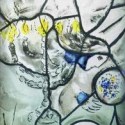
11.13.12 (Cheshvan 28, 5773) In times of testing, how we desperately do we need a sense of companionship and intimacy with the Lord! When you feel abandoned, ashamed, or alone; or when you are afraid and unsure of yourself; or when pain distances you from others, nudging you to loneliness, then may God's Spirit brood over you, whispering your name, reminding you that you are never alone, and that God Himself is forever for you. May the Living God quicken these precious words of love to your hurting heart:
אַל־תִּירָא כִּי עִמְּךָ־אָנִי אַל־תִּשְׁתָּע כִּי־אֲנִי אֱלהֶיךָ
אִמַּצְתִּיךָ אַף־עֲזַרְתִּיךָ אַף־תְּמַכְתִּיךָ בִּימִין צִדְקִי
al · ti·ra · ki · im·me·kha · a·ni · al · tish·ta · ki · a·ni · E·lo·he·kha
im·matz·ti·kha · af · a·zar·ti·kha · af · te·makh·ti·kha · bi·min · tzid·ki

"Fear not, for I am with you; be not dismayed, for I am your God;
I will strengthen you, I will help you,
I will uphold you with my righteous right hand."
(Isaiah 41:10)

Download Study Card
Al-tirah, "Be not afraid." Over and over again in the Scriptures we hear the LORD saying to those who trust in Him, al-tirah, "be not afraid." Nachman of Breslov is reported to have once said, "All the earth is a very narrow bridge (כָּל־הָעוֹלָם כֻּלּוֹ גֶּשֶׁר צַר מְאד), and the point of life is never to be afraid." Likewise we trust Yeshua to be the Bridge to the Father, the narrow way of passage that leads to everlasting life. He calls out to us in the storms of this world, "Take heart. It is I; be not afraid" (Matt. 14:27). When Peter answered that call and attempted to walk across the stormy waters, he lost courage and began to sink, but Yeshua immediately reached out his hand and took hold of him, saying, "O you of little faith, why did you doubt (literally, think twice)?"
God's love is what we desperately need, isn't it? Especially in moments when we feel wounded, alone, unworthy, afraid, and needy; even when we succumb to the depths of despair... And yet despite everything, God saves us from ourselves, from our worst fears, and from the hell of shame and abandonment.... As it is written, "Who will separate us from the love of the Messiah? Trouble? Hardship? Persecution? Hunger? Poverty? Danger? War? As the Scripture declares, "For your sake we are being put to death all day long, we are considered sheep to be slaughtered." No, in all these things we are hyperconquerors, through the One who has loved us. For I am convinced that neither death nor life, neither angels nor other heavenly rulers, neither what exists nor what is coming, neither powers above nor powers below, nor any other created thing will be able to separate us from the love of God which comes to us through the Messiah Yeshua, our Lord" (Rom. 8:35-39).
It's really true: Jesus loves you....Therefore "fear no evil," because God is with you, even in the darkness (Psalm 23:4). As it is written: "Surely goodness and love shall follow you all the days of your life, and you shall dwell in the house of the LORD forever" (Psalm 23:6).
 |
Our Daily Teshuvah...

11.12.12 (Cheshvan 27, 5773) There are first things without which nothing else follows... For instance teshuvah (i.e., "repentance") means letting go of those desires that block or impede our reception of God's grace... This may include letting go of the supposed need to find our self-worth based on our performance rather than by accepting God's love. Therefore the very first commandment is always, Anochi Adonai Elohekha: "I AM the LORD thy God," since this is the invitation to know God's heart. Finding God's heart for you is basic to the rest of the adventure of faith.
Every Soul's Passion...

11.12.12 (Cheshvan 27, 5773) "Everybody wants to go to heaven, but nobody wants to die..." Everybody wants the finished product of a surrendered life, but no one wants the process, the painful shattering, the revelation of the end of themselves... And yet it is only by means of affliction that the "outer shell of the seed" is broken so that new life can burst forth: "I tell you the solemn truth, unless a kernel of wheat falls into the ground and dies, it remains by itself alone. But if it dies, it produces much grain" (John 12:24). If the seed does not fall to the ground and die, αὐτὸς μόνος μένει - it remains alone - by itself...
Since we will not surrender without struggle, God must intervene and save us from ourselves. Each of us must "go to Peniel" to wrestle with the Angel; each of us must be renamed from Ya'akov ("a supplanter") to Israel ("a prince with God"). Like Jacob, we will prevail with God when we give up the fight and accept our brokenness. We win by losing...
It's been said that we can never know that God is all we need until God is all we have left (John 15:5). Therefore "blessed are the poor in spirit, for theirs is the kingdom of heaven; blessed are those who mourn, for they shall be comforted; blessed are those who hunger and thirst for righteousness, for they shall be filled..."
טֶרֶם אֶעֱנֶה אֲנִי שׁגֵג
וְעַתָּה אִמְרָתְךָ שָׁמָרְתִּי
te·rem · e·e·neh · a·ni · sho·geg
ve·at·tah · im·ra·te·kha · sha·mar·ti

"Before I was afflicted I went astray,
but now I keep your word."
(Psalm 119:67)

Torah with Heart....
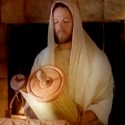
11.12.12 (Cheshvan 27, 5773) "Do not think that I have come to abolish the Torah or the Prophets; I have not come to abolish them but to fulfill them. For truly, I say to you, until heaven and earth pass away, not an Yod, nor even "the stroke of a Yod" (קוֹצוֹ שֶׁל יוֹד), will pass from the Torah until all is accomplished. Therefore whoever relaxes one of the least of these commandments and teaches others to do the same will be called least in the kingdom of heaven, but whoever does them and teaches them will be called great in the kingdom of heaven (Matt. 5:17-19). Not everyone who says to me, 'Lord, Lord,' will enter the kingdom of heaven, but the one who does the will of my Father who is in heaven. You will know them by their fruits: On that day many will say to me, 'Lord, Lord, did we not prophesy in your name, and cast out demons in your name, and do many mighty works in your name?' And then will I declare to them, 'I never knew you; depart from me, you workers of lawlessness' (i.e., ἀνομία, from (α-) meaning "not," and (νόμος) meaning "law"; Matt. 7:20-23).
אַחֲלַי יִכּנוּ דְרָכָי לִשְׁמר חֻקֶּיךָ
אָז לא־אֵבוֹשׁ בְּהַבִּיטִי אֶל־כָּל־מִצְוֹתֶיךָ
אוֹדְךָ בְּישֶׁר לֵבָב בְּלָמְדִי מִשְׁפְּטֵי צִדְקֶך
a·cha·lai · yik·ko·nu · de·ra·khai · lish·mor · chuk·ke·kha
az · lo · e·vosh · be·ha·bi·ti · el · kol · mitz·vo·te·kha
o·de·kha · be·yo·sher · le·vav · be·lo·me·di · mish·pe·tei · tzid·ke·kha

"Oh that my ways may be steadfast in keeping your decrees;
then I shall not be put to shame, having my eyes fixed on all your commandments.
I will praise you with an upright heart, when I learn your righteous rules."
(Psalm 119:5-7)

Though we are not justified by our own efforts at attaining righteousness (Titus 3:3-8), nonetheless we are commanded to esteem and to obey the truth of God's law by means of the Spirit of God, and indeed the mark of the New Covenant is that the Torah (תּוֹרָה) would be "put within us" and "written upon our hearts" (Jer. 31:33; Heb. 10:16). So how did the institutionalized church ever decide that the Torah was somehow irrelevant to followers of Yeshua our Lord, who was the very "Voice of the Living God speaking from the midst of the fire" at Sinai (Deut. 5:26)? After all, it was Yeshua who admonished us to "enter by the narrow gate. For the gate is wide and the way is easy that leads to destruction, and those who enter by it are many. For the gate is narrow and the way is hard that leads to life, and those who find it are few" (Matt. 7:13-14). Tragically, many churches today teach just the opposite, inexplicably claiming that faith somehow makes us free of the holiness and truth expressed in the Torah. May God enable each of us to say, "I delight to do your will, O my God; your law is within my heart" (Psalm 40:8).
 |
Parashat Toldot - תולדת

[ The following is related to this week's Torah reading, Toldot ("generations"). Please read the Torah portion to "find your place" here. ]
11.11.12 (Cheshvan 26, 5773) Last week's Torah (Chayei Sarah) told how Abraham's faithful servant Eliezer sought a bride for Isaac from among Abraham's relatives living in Mesopotamia. In response to his prayer to the LORD, Eliezer was shown that Abraham's nephew's daughter Rebekah was chosen to be one of the great matriarchs of Israel.
This week's reading (Toldot) continues the story by revealing that Isaac and Rebekah had been married for twenty years but were still without an heir to carry on the family line. Finally their prayers were answered and Rebekah conceived, though not without complications. When she inquired of the LORD about her travail, God told her that she was carrying twins that would be heads of two rival nations, but the younger child would in fact become the promised heir of the chosen people. When the day came for Rebekah to give birth, the first child came out "red and covered with hair," so they called his name Esau ("hairy"); then his brother came out with his hand grasping Esau's heel, so they named him Ya'akov ("supplanter," from the Hebrew root meaning "heel").
The Torah describes that Esau became a hunter, "a man of the field," while Jacob was ish tam yoshev ohalim, "a wholesome man, who lived in tents." Isaac favored Esau; but Rebekah, believing the promise of the LORD, favored Jacob...
The portion then gives us a look at the spiritual life of the two boys. According to Jewish tradition, on the day of the funeral of their grandfather Abraham, Jacob was cooking lentil soup for Isaac, the traditional mourner's meal. Esau rushed in from a hunting expedition, exhausted and hungry. He then begged Jacob to give him some of "that red stuff" (i.e, ha'dom hazeh), but Jacob answered that he would give him some only if he would sell him his birthright. Esau agreed to the terms and discounted his birthright as being worth only a bowl of beans (on account of this incident, Esau was given the additional name of Edom ("red"). In this manner the Torah describes how Esau "spurned the birthright."
Years later, when Isaac was old and blind, Jacob (with his mother Rebekah's help) tricked Isaac into conferring the blessing of the firstborn upon him, thereby making Jacob the heir of the family, and not Esau. When the ruse was discovered, however, Esau sought to kill his brother, and Jacob was forced to flee his home, never to see his mother again...
Note: For more information, please read the Torah summary page for Toldot and its related articles. You can also download the Shabbat "Table Talk" for the portion here:
The Faith of Rebekah...

[ The following entry is related to this week's Torah reading, parashat Chayei Sarah. Please read the Torah portion to find your place here. ]
11.09.12 (Cheshvan 24, 5773) The first mention of Isaac after he had been offered upon the altar at Moriah concerned the mission to find a bride suitable for him - a picture of the role of the Holy Spirit searching out a bride for the Messiah... Notice that the name of Abraham's servant commissioned to find Isaac's bride was not mentioned, just as the Holy Spirit does not speak of himself, but "will take the things of Mine and show them to you" (John 16:13-15). Note further that the servant spoke of the glory of the "father's house," the wonder of the bridegroom who would inherit all things, and extended the invitation to become betrothed by faith.... Young Rebekah was willing to leave all that she knew based on an "otherworldly" promise; her response to the servant's invitation was simply: "I will go" (Gen. 24:58). Likewise the Spirit asks each of us: "Will you go?"
Note: Though he is not explicitly named in the account, the "elder servant" in search of Isaac's bride was likely Eliezer (אֱלִיעֶזֶר), whose name literally means "my God will help," a picture of God's Spirit "com-forting" (i.e., giving strength) to his people. For more on this topic, see the page, "Eliezer and Ruach HaKodesh."
Personal Update:
I have been sleepless because of pain in the lower abdomen region for the last two days. After some blood tests and routine exams last week, I am hoping to get a CAT scan early next week. Please pray that this test might reveal whatever is causing this pain, discomfort, etc., and that a remedy will be found. Thank you, chaverim...
 |
A Blessed Brokenness...

11.08.12 (Cheshvan 23, 5773) Genuine spirituality involves a sense of irremediable brokenness, a feeling that you are not whole, that you are a mess, and that your need for God's healing is constant and relentless... Contrary to the ideals of humanism, spirituality is a state of "blessed neediness," of being "poor in spirit," that aches with inner desperation for God's power of healing. We take heart, then, from the words of Scripture: "The LORD is near to the brokenhearted and saves the crushed in spirit" (Psalm 34:18).
קָרוֹב יְהוָה לְנִשְׁבְּרֵי־לֵב
וְאֶת־דַּכְּאֵי־רוּחַ יוֹשִׁיעַ
ka·rov · Adonai · le·nish·be·rei · lev
ve·et · da·kei · ru·ach · yo·shi·a

"The LORD is near to the brokenhearted
and saves the crushed in spirit."
(Psalm 34:18)

Hebrew Study Card
Of our Messiah it is written, "A bruised reed shall he not break, and the smoking flax shall he not quench" (Isa. 42:3)... People conscious of their frailty and who have been crushed because of it are likened to "bruised reeds" whom the Messiah shall bring no injury. Indeed, the LORD binds up the broken of heart and gives liberty to those in bondage (Isa. 61:1). Likewise "a smoking flax shall he not quench" pictures the LORD tending to an unsteady flame ready to expire, adding special oil to cause it to burn more brightly....
The Savior seeks the "trampled and bruised," the poor in spirit, and those crushed by the blows of this fallen world and offers them healing: "The Son of Man came to seek and to save the lost" (Luke 19:10), and therefore He is found in the midst of the leper colonies of the hurting, the forgotten, and the rejected. As the great "Man of Sorrows" (i.e., ish makhovot: אִישׁ מַכְאבוֹת) he understands the language of our pain (Isa. 53:3).
"For God so loved the world" that he became entirely unesteemed -- "despised and rejected of men, a man of pains, acquainted with sickness" – so that he could taste rejection, sorrow, pain, and death for every man (John 3:16; Heb. 2:9). "For our sake God made Him to be sin who knew no sin, so that in Him we might become the righteousness of God" (2 Cor. 5:21). It was the love of God that put Yeshua on the Cross, and because of Yeshua, God forever exchanges our inner hell and abandonment with His everlasting love and acceptance. It is finished, and may His great Name be praised in all the earth...
 |
The Akedah of Sarah
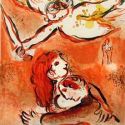
[ The following entry is related to this week's Torah reading, parashat Chayei Sarah. Please read the Torah portion to find your place here. ]
11.08.12 (Cheshvan 23, 5773) Recall that Sarah gave birth to Isaac when she was 91 years old (Gen. 17:17, 21), and she later died when Isaac was 36 years old, at the age 127 (Gen. 23:1). The Torah does not explicitly state the cause of her death, though according to Jewish tradition Sarah died from shock after learning about what happened to her son at the hand of her husband (i.e., the near sacrifice of Isaac at Moriah). It was just too much for her heart to bear. How could she comprehend Abraham's actions?
Though it is clear that both Abraham and Isaac surely were tested during the ordeal, it's a provocative thought that Sarah - not Isaac - became the real victim of the Akedah. She, not Isaac, is the one who dies, after all. Indeed Jewish tradition has associated the cries of Sarah with the blasts of the shofar sounded during Rosh Hashanah. The broken notes of the shofar are thought to recall her crying for her son...
Note: For more on this subject please see the "Akedah of Sarah."
 |
God's Hidden Treasures...
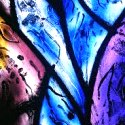
11.07.12 (Cheshvan 22, 5773) Just as God's anger burns every day (אֵל זעֵם בְּכָל־יוֹם), though it is restrained as it is being stored up (Psalm 7:11), so is His goodness concealed, hidden from the ways of this world, as it says: "How abundant is your goodness which you have stored up (i.e., concealed as treasure) for those who fear You" (Psalm 31:20). God's good purposes are not discerned in the superficial ways of men and their vanities, but rather in the redemptive depths of life. In the "secret of God's Presence" we are hidden from the conspiracies of men; we are preserved in God's sukkah "from the strife of tongues."
מָה רַב־טוּבְךָ אֲשֶׁר־צָפַנְתָּ לִּירֵאֶיךָ
פָּעַלְתָּ לַחסִים בָּךְ נֶגֶד בְּנֵי אָדָם
תַּסְתִּירֵם בְּסֵתֶר פָּנֶיךָ מֵרֻכְסֵי אִישׁ
תִּצְפְּנֵם בְּסֻכָּה מֵרִיב לְשׁנוֹת
mah · rav · tu·ve·kha · a·sher · tza·fan·ta · li·re·e·kha
pa·al·ta · la·cho·sim · bakh · ne·ged · be·nei · a·dam
tas·ti·rem · be·se·ter · pa·ne·kha · me·rukh·e·sei · ish
titz·pe·nem · be·suk·kah · me·riv · le·sho·not

"How abundant is your goodness that you have stored up for those who fear you
and worked for those who take refuge in you in the sight of the children of man!
In the Secret of your Presence you hide them from the conspiracies of men;
you store them up (as a treasure) in your Sukkah from the strife of tongues."
(Psalm 31:19-20)

God "stores up" treasure (צָפִין) for those who fear Him... "As it is written, 'What no eye has seen, nor ear heard, nor the heart of man imagined, what God has prepared for those who love him' - these very things God has revealed to us through the Spirit. For the Spirit searches everything, even the depths of God" (1 Cor. 2:9-10). The LORD makes "places of refuge" (חוֹסִים) for his children; He hides those who revere His Name in the "Secret Presence" (lit., "the secret of His Face"), protected from plots and conspiracies of both devils and evil men. The LORD treasures those who trust in Him. God is our Hiding Place, the covert from the storms of this world (Psalm 32:7). "He who dwells in the secret place of the Most High will abide in the shadow of Shaddai" (Psalm 91:1). Those that fear the Lord are called his "hidden" or "treasured" ones (Psalm 83:3).
Note: Please remember me in your prayers as I have been experiencing some serious health concerns lately. Thank you, chaverim.
 |
Keep Focused on God...
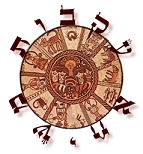
11.07.12 (Cheshvan 22, 5773) "O our God ... we are powerless against this great horde that is coming against us (an image of the world and its power structures arrayed against the remnant of faith). We do not know what to do, but our eyes are on you." And the Spirit of the LORD said, 'Do not be afraid and do not be dismayed, for the battle is not yours but God's: you will not need to fight in this battle. Stand firm, hold your position, and see the salvation of the LORD on your behalf... Believe (אֲמִינוּ) in the LORD your God, and you will be established (תֵּאָמֵנוּ). Give thanks to the LORD, for his steadfast love endures forever."
"O LORD, God of our fathers, you are the God of heaven, and you rule over all the kingdoms of the nations. In your hand are power and might, so that none is able to stand against you" (2 Chron. 20:6). God is the great king over all the earth (Psalm 47:2). The LORD God of Israel is in complete control of all things. He is the King today, just as he is the King forever. Adonai melekh, Adonai malakh, Adonai yimlokh le'olam va'ed: "The LORD reigns; the LORD has reigned and the LORD will always reign." Therefore may we all say, yehi shem Adonai mevorakh (יְהִי שֵׁם יהוה מְברָךְ) - "Let the Name of the LORD be praised." Indeed, Yeshua is called elyon lemalkhei-aretz (עֶלְיוֹן לְמַלְכֵי־אָרֶץ) - the "Ruler of the princes of the earth" (Rev. 1:5) - and that means the princes will answer to Him. "For though the vision awaits its appointed time; it hastens to the end -- it will not lie. If it seems slow, wait for it; it will surely come; it will not delay" (Hab. 2:3).
 |
The Kings of the Earth....

11.07.12 (Cheshvan 22, 5773) "When I thought how to understand this (i.e., the prosperity of the wicked), it seemed to me a wearisome task, until I went into the sanctuary of God; and then I discerned their end" (Psalm 73:16-17). We must remember that what man esteems and what God esteems are two very different things. Many questions are not answered by human reason but by coming before the Divine Presence, where the Spirit bestows assurances regarding the deeper purposes of God. Though the wicked seem at ease now, they abide in "slippery places" where their fall to ruin is certain. "Those who are far from You will perish; you destroy all who are unfaithful to you. But as for me, it is good to be near God. I have made the Sovereign Lord my refuge..." (Psalm 73)
וַאֲנִי תָמִיד עִמָּךְ אָחַזְתָּ בְּיַד־יְמִינִי
בַּעֲצָתְךָ תַנְחֵנִי וְאַחַר כָּבוֹד תִּקָּחֵנִי
מִי־לִי בַשָּׁמָיִם וְעִמְּךָ לא־חָפַצְתִּי בָאָרֶץ
va·ani · ta·mid · im·makh · a·chaz·ta · be·yad · ye·mi·ni
ba·a·tza·te·kha · tan·che·ni · ve·a·char · ka·vod · tik·ka·che·ni
mi · li · va·sha·ma·yim · ve·im·me·kha · lo · cha·fatz·ti · va·a·retz

"Nevertheless, I am continually with you; you hold my right hand.
You guide me with your counsel, and afterward you will receive me to glory.
Whom have I in heaven but you? And there is nothing on earth
that I desire besides you." (Psalm 73:23-25)

Of this evil world it is written, "Why do the people rage and the nations devise schemes that will fail? The kings of the earth set themselves, and the rulers take counsel together, against the LORD and against his Mashiach, saying, 'Let us tear off the shackles of their yoke, and throw off their ropes from us!' But the enthroned LORD laughs at their insolence and holds them in derision, until the appointed hour when He will speak to them in his wrath and terrify them in his fury" (Psalm 2:1-5).
The LORD God Almighty will surely break the pride of the "kings of the earth" with a rod of iron and dash them in pieces like a potter's vessel, and the shattering will be so severe that among its fragments not a shard will be found with which to take fire from the hearth, or to dip up water out of the cistern (Psalm 2:9; Isa. 30:14). For from His mouth comes a sharp sword with which to strike down the nations, and He will rule them with a rod of iron. He will tread the winepress of the fury of the wrath of God the Almighty (Rev. 19:15). "As you looked, a stone was cut out by no human hand, and it struck the image on its feet of iron and clay, breaking them in pieces. Then the iron, the clay, the bronze, the silver, and the gold, all together were broken in pieces, and became like the chaff of the summer threshing floors; and the wind carried them away, so that not a trace of them could be found. But the stone that struck the image became a great mountain and filled the whole earth" (Dan. 2:34-35). "And the God of heaven will set up a kingdom that shall never be destroyed ... and it shall stand forever" (Dan. 2:44). One day the edifice of man's godless pride will come crashing down, and there will be no trace left of its rubble...
 |
The First Enemy of Israel...

[ The following entry is related to this week's Torah reading, parashat Chayei Sarah. Please read the Torah portion to find your place here. ]
11.06.12 (Cheshvan 21, 5773) Our Torah portion this week (Chayei Sarah) introduces us to an unsavory character named Laban, the grandnephew of Abraham, brother of Rebekah, father of Leah and Rachel, and the first great enemy of the Jewish people. It was Laban, you will recall, who deceived Jacob ten times, switched his daughters in marriage, exploited his labor, and finally attempted to hold the entire family as his slaves. According to midrash, Laban is called "Kemuel" (קְמוּאֵל) because he rose up (קוּם) against God (אֵל). The Zohar (mystical commentary on the Torah) states that Laban was an expert in sorcery (כִּשּׁוּף) with which he sought to destroy Jacob. Therefore he said to Jacob, "I have learned by divination (i.e., נַחַשׁ, from the same root as nachash, the "serpent" in Eden) that the LORD has blessed me because of you" (Gen. 30:27). The meaning of the word Laban (לָבָן) is "white," suggesting purity, but the sages note that the letters of his name are rearranged to form the word naval (נָבָל), meaning a scoundrel, a term that revealed his true nature.
 |
 |
Theology and Election Day...

11.06.12 (Cheshvan 21, 5773) "Hear the word of the LORD, O children of Israel, for the LORD has a controversy with the inhabitants of the land. There is no truth or steadfast love, and no knowledge of God in the land; there is only swearing, lying, murder, stealing, and committing adultery; they break all bounds, and bloodshed follows bloodshed. Therefore the land mourns, and all who dwell in it languish, and also the beasts of the field and the birds of the heavens, and even the fish of the sea are taken away" (Hosea 4:1-3).
"For you are not a God who delights in wickedness; evil may not dwell with you. The boastful shall not stand before your eyes; you hate all evildoers. You destroy those who speak lies; the LORD abhors the bloodthirsty and deceitful man" (Psalm 5:4-6). The lie cannot stand before the truth any more than darkness can overcome the light... Therefore the LORD God of Truth destroys those who speak lies and act treacherously because the power of the lie cannot abide the Divine Presence (Rev. 22:15).
Regardless of whoever "wins" political office during this election year, remember that the LORD is the true King over all the earth, and we owe our allegiance to Him. When we earnestly pray, "Thy kingdom come" to the Lord our God, we confess this truth. We are first of all citizens of heavenly Zion and are made ambassadors of the King Himself. "And if it is evil in your eyes to serve the LORD, choose this day whom you will serve... But as for me and my house, we will serve the LORD."
וְאִם רַע בְּעֵינֵיכֶם לַעֲבד אֶת־יְהוָה
בַּחֲרוּ לָכֶם הַיּוֹם אֶת־מִי תַעֲבדוּן
וְאָנכִי וּבֵיתִי נַעֲבד אֶת־יְהוָה
ve·im · ra · be·ei·ne·khem · la·vod · et · Adonai
ba·cha·ru · la·khem · hai·yom · et · mi · ta·a·vo·dun
ve·a·no·khi · u·ve·ti · na·a·vod · et · Adonai

"And if it is evil in your eyes to serve the LORD,
choose this day whom you will serve...
But as for me and my house, we will serve the LORD."
(Josh. 24:15)

The King of king of kings is assuredly not up for election, but you assuredly are... Are you one of the elect? The choice is yours: Whom will you serve? Your life is under divine examination that perfectly discerns what you really value, love, and worship. May the LORD God help your heart carry your feet, friends!
בְּכָל־מָקוֹם עֵינֵי יְהוָה
צפוֹת רָעִים וְטוֹבִים
be·khol · ma·kom ·ei·nei · Adonai
tzo·fot · ra·im · ve·to·vim

"The eyes of the LORD are in every place,
keeping watch on the evil and the good."
(Prov. 15:3)

The LORD's providential vision sees everything with perfect comprehension and infinite wisdom: both the darkness and light are alike to Him... Your Heavenly Father "sees in secret." All is open and manifest before Him: "Nothing in all creation is hidden from God's sight. Everything is uncovered and laid bare before the eyes of Him to whom we must give account" (Heb. 4:13). "From heaven the LORD looks down and sees all mankind, from his dwelling place he watches all who live on earth; he who forms the hearts of all, considers everything they do" (Psalm 33:13-15). God's seeing is the means of his sustaining, and were He to cease from seeing a thing, it would immediately dissipate into the void...
The LORD is the Source of all life in the universe: כָּל־הַמַּעֲשִׂים נִהְיוּ עַל־יָדוֹ / "All things were made by Him (John 1:3). The "Word made flesh" is the "image of the invisible God" and the "radiance of the glory of God and the exact imprint (χαρακτήρ, 'character') of his nature" (Col. 1:15). All of creation is being constantly upheld by the word of His power (Heb. 1:3): "All things were created by Him (i.e., Yeshua), and for Him" and in Him all things consist (συνεστηκεν, lit. "stick together") (Col. 1:16-17). Creation begins and ends with the redemptive love of God as manifested in the Person of Yeshua our Mashiach... He is the Center of Creation - it's beginning and end. As it is written: אָנכִי אָלֶף וְתָו רִאשׁוֹן וְאַחֲרוֹן ראשׁ וָסוֹף / "I am the 'A' and the 'Z,' the First and the Last, the Beginning and the End" (Rev. 22:13). Indeed, Yeshua is מֶלֶךְ מַלְכֵי הַמְּלָכִים / Melech Malchei Hamelachim: The "King of kings of kings." He is LORD of all possible worlds -- from the highest celestial glory to the dust of death upon a cross... יְהִי שֵׁם יהוה מְברָךְ / yehi shem Adonai mevorakh: "Let the Name of the LORD be blessed" forever and ever (Psalm 113:2).
Da lifnei mi atah omed: Know before whom you are standing! Rabbi Judah said, "Know what is beyond, what is above; and eye that sees, and ear that hears, and a hand that writes. Know this and you will be free: Where do you come from Where are you going? To whom do you give an account?" May God give you wisdom as you consider these things...
 |
Torah of a Broken Heart...

11.06.12 (Cheshvan 21, 5773) Part of the reason for our brokenness is to reveal our need for one another. "Bear one another's burdens, and so fulfill the Torah of Messiah" (Gal. 6:2). Spiritual life is meant to be shared within community, and that means making ourselves vulnerable by confessing and honoring the truth about our pain. "I really love you, brother!" "Really? Then tell me where I hurt..." We are all broken vessels that can't make it on our own, and therefore God has decreed that we must confess the truth to one another in order to find lasting healing (James 5:16).
Because the cross is the place of God's own brokenness, it is also the place of our own healing. Because He is so abandoned, broken, and despised, we can allow Him to reveal to us our own woundedness without getting angry or defensive.... The cross imparts courage so that we can encounter our own sickness without being ashamed. We find healing by sharing our own pain, grief, loss, and shame -- without the need to pretend that we are someone other than who we really are. Thank God for the cross...
Note: Confession is an intensely personal thing, certainly not something to be "announced" to a crowd of any kind.... Find a safe person of faith and then open your heart. This is very sensitive and painful stuff, and it is vital that it is heard in quietness and respect...
 |
Learn to let go...
11.06.12 (Cheshvan 21, 5773) We can't open our hearts to God's grace when we are addicted to justifying or blaming ourselves... We have to let go of all that, and in a state of desperate vulnerability, receive God's love for who we are, just as we are. True surrender is not a matter of giving up what you desire as much as it is discovering what you have really desired all along...
Give up both the hidden desire to be better than others as well as any self-reproach for not being so. Quit comparing yourself to others. You can't hear the Spirit of God through the clamor of the insecure ego. Repent of the sin of belittling yourself - either by pretending to be less than what you are or by preemptively faulting yourself in an attempt at self-protection. Do not judge apart from sympathy, and that includes judging yourself...
The Day is Approaching...

11.05.12 (Cheshvan 20, 5773) A Yiddish proverb says, "If God lived on earth people would break his windows," which is to say that his kingdom is not of this world, and that the princes of this world are often the very ringleaders of those who hate him (Psalm 2:2-4).
While the world cries out for a political "savior" who will seemingly solve the (prefabricated) economic and security problems of the nations, the Spirit of the LORD urgently warns: "The great day of the LORD is near, near and hastening fast; the sound of the day of the LORD is bitter; the mighty man cries aloud there. A day of wrath is that day, a day of distress and anguish, a day of ruin and devastation, a day of darkness and gloom, a day of clouds and thick darkness... I will bring distress on mankind, so that they shall walk like the blind, because they have sinned against the LORD; their blood shall be poured out like dust, and their flesh like dung. Neither their silver nor their gold shall be able to deliver them on the day of the wrath of the LORD. In the fire of his jealousy, all the earth shall be consumed; for a full and sudden end he will make of all the inhabitants of the earth" (Zeph. 1:14-18).
קָרוֹב יוֹם־יהוה הַגָּדוֹל קָרוֹב וּמַהֵר מְאד
קוֹל יוֹם יהוה מַר צרֵחַ שָׁם גִּבּוֹר׃
ka·rov · yom · Adonai · hag·ga·dol, · kar·ov · u'ma·her · me·od,
kol · yom · Adonai · mar · tzo·re·ach · sham · gib·bor

"The great day of the LORD is near, near and hastening fast;
the sound of the day of the LORD is bitter; the mighty man cries aloud."
(Zeph. 1:14)

Although "Day of the LORD" is often associated with Tishah B'Av and the catastrophic destruction of the Jewish Temple, the words of the prophets were only partially fulfilled, and there awaits another Day coming when God will terribly shake the entire earth (Isa. 2:19). "For the great day of their wrath has come, and who can stand?" (Rev. 6:17). The prophet Malachi likewise says: "'Surely the day is coming; it will burn like a furnace. All the arrogant and every evildoer will be stubble, and that day that is coming will set them on fire,' says the LORD Almighty. 'Not a root or a branch will be left to them'" (Mal. 4:1). For those who are godless, the great Day of the LORD is a time of horrific judgment, but for those who belong to the LORD, it represents a day of victory and great blessing. Regarding that day the prophet Malachi said, "Then you will trample down the wicked; they will be ashes under the soles of your feet on the day when I do these things" (Mal. 4:3).
Meanwhile we are not to be afraid of man or his devious schemes. Recall that when Gehazi, the servant of Elisha, expressed fear over the army of Syria that had come to seize them, the prophet said, "Do not be afraid, for those who are with us are more than those who are with them." Then Elisha prayed and said, "O LORD, please open his eyes that he may see." So the LORD opened the eyes of the young man, and he saw, and behold, the mountain was full of horses and chariots of fire all around Elisha (2 Kings 6:16-17).
 |
Healing for Bitterness...

11.05.12 (Cheshvan 20, 5773) The Kobriner Rebbe used to say, "When you suffer tribulation or testing, do not say, 'this is evil,' for God sends no evil; but rather say 'this is a bitter experience.' Think of trouble as though it were a bitter medicine prescribed by a physician that will bring the cure." Likewise, when trouble befalls us we are not required to say, 'this is the good' (גַּם זוּ הַטּוֹבָה), implying that this is the best of all possible outcomes, but only 'this is for good' (גַּם זוּ לְטוֹבָה), a good of which we have no immediate knowledge, though we keep faith that it is ultimately for our good and for God's praise... As it is written, "Behold, it was for my healing that I had great bitterness; but in love you have delivered my life from the pit of destruction, for you have cast all my sins behind your back:
הִנֵּה לְשָׁלוֹם מַר־לִי מָר
וְאַתָּה חָשַׁקְתָּ נַפְשִׁי מִשַּׁחַת בְּלִי
כִּי הִשְׁלַכְתָּ אַחֲרֵי גֵוְךָ כָּל־חֲטָאָי
hi·nei · le·sha·lom · mar · li · mar
ve·at·tah · cha·shak·ta · naf·shi · mi·sha·chat · be·li
ki · hish·lakh·ta · a·cha·rei · gev·kha · kol · cha·ta·ai

"Behold, it was for my healing that I had great bitterness;
but You in love have delivered my life from the pit of destruction,
for you have cast all my sins behind your back."
(Isa. 38:17)

Note that the phrase "pit of destruction" (מִשַּׁחַת בְּלִי) might be understood as the "pit of wearing out," that is, the pit of nothingness, consumption, vanity, or worthlessness (i.e., belial: בְּלִיַּעַל). The idea is that the LORD resuces us "from the pit of nothingness," descending into the pit of of our shame to draw us out from it...
I say, "My endurance has perished; so has my hope from the LORD." Remember my affliction and my wanderings, the wormwood and the gall! My soul continually remembers it and is bowed down within me. But this I call to mind, and therefore I have hope: The faithful love of the LORD never ceases; his mercies never come to an end; they are new every morning; great is your faithfulness. "The LORD is my portion," says my soul, "therefore I will hope in him." (Lam. 3:18-24)
חַסְדֵי יְהוָה כִּי לא־תָמְנוּ כִּי לא־כָלוּ רַחֲמָיו׃
חֲדָשִׁים לַבְּקָרִים רַבָּה אֱמוּנָתֶךָ׃
chas·dei · Adonai · ki · lo-ta·me·nu, · ki · lo-kha·lu · ra·cha·mav,
cha·da·shim · la·be·ka·rim · rab·bah · e·mu·na·te·kha

"The faithful love (חֶסֶד) of the LORD never ceases;
his mercies (רַחֲמִים) never come to an end;
they are new every morning (חֲדָשִׁים לַבְּקָרִים);
great is your faithfulness (אֱמוּנָה)"
(Lam. 3:22-23)

Hebrew Study Card
Acceptance and Surrender...
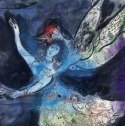
[ The following entry is related to this week's Torah reading, parashat Chayei Sarah. Please read the Torah portion to find your place here. ]
11.05.12 (Cheshvan 20, 5773) When Abraham approached the Hittites to purchase a burial site, he said: "I am a sojourner and settler (גֵּר־וְתוֹשָׁב) among you; sell me a place to bury my dead..." (Gen. 23:4). King David likewise confessed: "For we are strangers with You, and sojourners like our fathers; our days on earth are like a shadow, without hope [in this world]" (1 Chron. 29:15). Life in olam hazeh (this world) is likened to a "burial site," a graveyard, a shadowy place of passing that leads to olam haba, the world to come, and to God's glorious kingdom. We cannot find lasting hope in this world and its values; all that must be buried and surrendered to God.
Rabbi Nachum once said this: "When my brother David Moshe opens the Book of Psalms and begins to praise, God calls down to him: 'David Moshe, my child, I put the whole world into your hands; now do with it just as you like.' O, if only God would give me the world, I'd know well enough what to do with it! But David Moshe is so faithful a servant that when he gives the world back, it is exactly as it was when he received it." Surrender. Let go, let God...
"Whoever loves his life loses it, and whoever hates his life in this world will keep it for eternal life" (John 12:25). This is paradoxical, of course, since it implies that truly loving life means "letting it go," relinquishing any claim upon it, and surrendering it completely to God's control, whereas hating life in this world means steadfastly clinging to the Eternal... Letting go means accepting that nothing ultimately belongs to us, and we therefore make peace with both our apparent successes as well as our disappointments. What you love is not yours to own but is a gift given to you for the present... We learn to accept that this day, despite its trouble, is a gift, a wonder, a miracle from God.
 |
Keening and Faith...

11.05.12 (Cheshvan 20, 5773) Lord, is there a place to protest the darkness? Can we rightfully rail against the ubiquity of pain, suffering, sorrow? Are we permitted to be afraid? There is much within us that remains unhealed - even in light of the cross... Is there voice to our pain? our questions? our struggle with sin? Mere human reason offers cold consolation in the presence of burning sorrow, loss, confusion, and heartache.... O Lord, protect me so that when I struggle against pain or recoil from darkness, I do not unwittingly find myself struggling against you. Help me to accept what I cannot change, but even more help me never to lose hope that your love is stronger than death itself. Give me your heart of compassion and sympathy for all who are hurting this hour. And may I never be ashamed; may I never grow bitter; may my sorrow lead me from strength to strength, and may you use my suffering for good. Amen.
Comfort and Darkness....
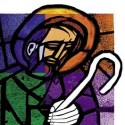
11.05.12 (Cheshvan 20, 5773) "Yea, though I walk through the valley of the shadow of death, I will fear no evil..." (Psalm 23:4). O God of Light, Light of the world, surely You know my need for light as I look to You, especially when darkness tries to overtake my hope. Despite my inability to see you now, help me to know that you are with me; let "thy rod and thy staff comfort me" and lead me closer to you. Lord, when I am afraid, quicken the faith you have put within my heart.
גַּם כִּי־אֵלֵךְ בְּגֵיא צַלְמָוֶת
לא־אִירָא רָע כִּי־אַתָּה עִמָּדִי
שִׁבְטְךָ וּמִשְׁעַנְתֶּךָ הֵמָּה יְנַחֲמֻנִי
gam · ki · e·lekh · be·gei · tzal·ma·vet
lo · i·ra · ra, · ki · at·tah · im·ma·di
shiv·te·kha · u·mish·an·te·kha · hem·mah · ye·na·cha·mu·ni

"Even though I walk through the valley of the shadow of death,
I will fear no evil, for You are with me;
Your rod and your staff, they comfort me"
(Psalm 23:4)

We are not left comfortless, chaverim. We must always remember that the LORD (יְהוָה) is our Good Shepherd, and His rod and staff are present, guiding and directing us, even in the deepest of darkness – even when the shadow (צֵל) of death itself (מָוֶת) seems to enshroud our way. God walks with you in the darkest valley, calling your name, saying, "do not be afraid." The LORD is always with you and you are never really alone; the LORD is your Comfortor, your Defender, and your Guide every step of the way...
"I do not see the road ahead of me, I cannot know for certain where it will end. Nor do I really know myself, and the fact that I think I am following your will does not mean I am actually doing so. But I believe the desire to please you does in fact please you, and I hope I have that desire in all that I am doing. I hope that I will never do anything apart from that desire. And I know that if I do this you will lead me by the right road, though I may know nothing about it. Therefore, I will trust you always, though I may seem to be lost and in the shadow of death. I will not fear, for your are ever with me, and you will never leave me to face my perils alone." - Thomas Merton
Therefore you need fear no evil because God has promised to walk with you through the toughest moments of life – even in moments of personal confusion, sorrow, and inner emptiness. The LORD gives us comfort (נָחַם) in the midst of our way: "For you are my lamp, O LORD, and my God who lightens my darkness" (2 Sam. 22:29).
Parashat Chayei Sarah...

11.04.12 (Cheshvan 19, 5773) Last week's parashah (Vayera) recounted how the LORD was faithful to Abraham and Sarah by miraculously giving them a son (Isaac) in their old age. Nonetheless, Abraham faced his greatest test of all by being asked to offer up his promised child as a sacrifice on Mount Moriah, the place of the future Temple. On account of Abraham's willingness to obey, the LORD promised that He would multiply his offspring as the stars of heaven and that in his seed (singular) all the nations of the earth would be blessed.
This week's parashah, Chayei Sarah - the "life of Sarah"- begins (paradoxically) with the account of Sarah's death (at age 127), and tells how the first great matriarch of the Jewish people was buried in the Cave of Machpelah in Hebron, a burial site which Abraham had legally purchased from Ephron the Hittite for four hundred shekels of silver.
After Sarah was buried, Abraham sought a wife for his son by commissioning his servant, Eliezer (whom Abraham had originally thought would be his heir), to solicit a wife for Isaac from among his relatives living in Mesopotamia (and not from among the Canaanites). Eliezer then set out on the 550 mile journey to Haran (also called the City of Nahor and the place where Abraham's father died), taking ten camels laden with gifts in search of a suitable bride. Providentially, and in answer to his prayer, as soon as Eliezer reached the city of Nahor he encountered Abraham's grand niece Rebekah drawing water at a well, where she graciously provided water for him and for his ten camels, thereby confirming that she was God's choice for Isaac.
Note: For more, please read the Torah summary page for Chayei Sarah and its related articles. You can also download the Shabbat Table Talk for the Torah portion here:
The Place of the Skull...

[ The following entry is related to this week's Torah reading, parashat Vayera. Please read the Torah portion to find your place here. ]
11.02.12 (Cheshvan 17, 5773) "God will provide Himself a Lamb - my son" (Gen. 22:8). The cross itself speaks to the question of "faith vs. works." At the time of the crucifixion of the Messiah, man was "shut out" because of the darkness and utter sanctity of the sacrifice of Yeshua as the Lamb of God who bore all the sins of the world... At the time of utmost darkness, man was shut out, put into a "deep sleep" not unlike what Abraham had earlier experienced at the covenant of the parts (Gen. 15:12). Every human being stood helplessly on the other side of the cross; no one else participated to make us right with God: It was all Yeshua and the Father, and the Father and Yeshua alone...
Shabbat Shalom, chaverim. Allow God to love you. There is nothing left for you to do other than to open your heart and receive. "It is finished," were Yeshua's last words from the cross, meaning, "It has been perfected - it is complete and present for you; there is nothing left to add." May you find rest and peace in what God has done for you...
 |
The Work of Faith...
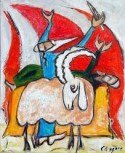
[ The following entry is related to this week's Torah reading, parashat Vayera. Please read the Torah portion to find your place here. ]
11.02.12 (Cheshvan 17, 5773) James the Righteous says that Abraham was "justified by works" (James 2:21), but surely this refers to the work of faith (τό ἔργον τῆς πίστεως) and not to the works of the law (מַעֲשֵׂי הַתּוֹרָה) - since the Torah explicitly prohibited human sacrifice (Gen. 9:5), and likewise the Angel of the LORD restrained Abraham's hand during the great test of faith (Gen. 22:12). When James therefore stated that Abraham was justified by his works, he implied that our actions ultimately reveal the inner life of faith. On the other hand, the apostle Paul's seemingly contrary statement that Abraham was not justified by works (Rom. 4:1-3) refers to his unwavering confidence in God's promise that his descendants would be as numerous as the stars in the heavens (Gen. 15:1-6). There is no real contradiction, then, since the two apostles were referring to two different episodes in their discussion of justification... As Yeshua said, "This is the work of God, that you believe in the One whom He has sent" (John 6:29).
The life of faith is inherently paradoxical, as Kierkegaard noted: "Ethically speaking, what Abraham planned to do was to murder Isaac; religiously, however, he was willing to sacrifice Isaac. In this contradiction lies the very anguish that can indeed make anyone sleepless. And yet without that anguish Abraham is not the one he is. Neither would faith be what it is." Although Abraham understood that God must be obeyed, he also understood that child sacrifice was immoral, and hence his struggle represented the collision between the imperative of reason and the imperative of faith. Choosing to heed the voice of reason (i.e., the "ethical" or the "universal") over the personal voice of God created a state of "fear and trembling" and a sense of being unable to communicate his passion and mission to others.
"God cannot stand good works in the sense of earning merit. Yet good works are required. They shall be and yet shall not be. They are necessary and yet one ought humbly to ignore their significance or at least forget that they are supposed to be of any significance. Good works are like a child giving his parents a present, purchased, however, with what the child has received from his parents. All the pretentiousness which otherwise is associated with giving a present disappears when the child understands that he has received from his parents the gift which he gives to them."
As Kierkegaard further commented: "Faith's conflict with the world is not a battle of thought with doubt, thought with thought. It is a battle of character. The person of faith is a person of character who does not insist upon comprehending everything. Now comes the conflict. The world insists that to believe what you cannot comprehend is not only blind obedience but obscurantism, stupidity, and so on. The world wants to alarm the believer against such foolishness. This is precisely why faith is a task for the person of character."
Note: For more on this vital topic, see "Faith Surpasses Reason."
Theology and Pain....

11.02.12 (Cheshvan 17, 5773) Personal suffering tests how well we have integrated our theology into our hearts... Faced with pain, life-threatening disease, and the prospect of death, all our pretenses are swept away. Pain can make us feel isolated, abandoned, alone, and afraid. It is then, in such dry places of the heart, that we need to renew our faith, to find the courage that affirms that God's love is stronger than death itself.
הֵן יִקְטְלֵנִי לא אֲיַחֵל
אַךְ־דְּרָכַי אֶל־פָּנָיו אוֹכִיחַ
hen · yik·te·lei·ni · lo · a·ya·chel
akh · de·ra·khai · el · pa·nav · o·khi·yah

"Though He slay me, I will hope in Him;
yet I will argue my ways to His face"
(Job 13:15)

Suffering threatens that of which we are most intimate, namely our very existence. Undoubtedly the "hottest moments" of pain come, however, when there is a sense of abandonment, a loss of hope, and even a fear of damnation that attends upon it. We must remember that even Yeshua tasted this most bitter cup of apparent abandonment by God: "My God, my God, why have you forsaken me?" (Psalm 22:1; Matt. 27:46). In times of lonely testing, we must recall the words of the beloved: "Set me as a seal upon your heart, as a seal upon your arm, for love is strong as death, jealousy is fierce as the grave. Its flashes are flashes of fire, the very flame of the LORD" (Song 8:6).
Abraham's Three Visitors...

[ The following entry is related to this week's Torah reading, parashat Vayera. Please read the Torah portion to find your place here. ]
11.02.12 (Cheshvan 17, 5773) Parashat Vayera begins: וַיֵּרָא אֵלָיו יהוה / Vayera elav Adonai: "and the LORD appeared to him (i.e., Abraham) by the terebinth trees of Mamre, as he sat at the door of his tent in the heat of the day" (Gen 18:1). The midrash colorfully states that the phrase "by the terebinth trees of Mamre" (בְּאֵלנֵי מַמְרֵא) should be read as "in the terebinth trees," that is, God manifested Himself "as a tree" to suggest that just as an old tree could still bear fruit, so would Abraham in his old age.
Rashi says it was the third day after Abraham's brit millah (i.e., circumcision) and God came (in a vision) to inquire as to his friend's welfare (this is regarded as a divine example of bikkur cholim (בִּקּוּר חוֹלִים), "visiting the sick"). During the vision, Abraham suddenly saw "three men" (שְׁלשָׁה אֲנָשִׁים) standing before him. But who were these strangers? According to the Jewish sages, they were the archangels Michael, Gabriel, and Raphael disguised as Arab wayfarers. Each angel had a distinct mission. Michael came to announce that Sarah would give birth to a son; Raphael came to heal Abraham from his circumcision; and Gabriel came to overthrow Sodom (Bava Metzia 86b).
Note: For more on this subject, please click here.
 |
Hebrew Wordplay...

[ The following entry is related to this week's Torah reading, parashat Vayera. Please read the Torah portion to find your place here. ]
11.02.12 (Cheshvan 17, 5773) The Hebrew Scriptures are filled with various kinds of wordplay. In addition to some humorous play on words (i.e., puns), you will discover alliteration, acrostics, parables, similes, metaphors, hyperboles, gematria, and other literary devices used in the Hebrew text. Some scholars even suggest that the first two words of the Torah (i.e., בְּרֵאשִׁית בָּרָא / bereshit bara) were intentionally spelled using the same initial three letters (בּ.ר.א) for the sake of "alliteration" (i.e., repetition of sound). At any rate, examples of wordplay often appear on the surface-level of the texts. For example, "Adam" (אָדָם) is a play on the word adamah (אֲדָמָה, "ground"); Chavah (חַוָּה, "Eve") is a play on the word chai (חַי, "life"); Cain (קַיִן) is a play on the verb kanah (קָנָה, "to get"), and so on (see Gen. 2:7, 3:20, 4:1). Of course, many other examples could be cited.
Of particular relevance to this week's Torah portion (Vayera) is the name Yitzchak (יִצְחָק, "Isaac"), which plays on the verb tzachak (צָחַק, "to laugh"). Some have said that tzachak is "onomatopoeic," that is, it imitates the sound of laughter itself. Appropriately enough, the root appears a number of times in the story of Isaac, though often with different connotations. The simple stem (kal) of tzachak conveys the idea of laughter, whether in joy or incredulity, though the stronger stem (piel) suggests more intense expressions, for example rejoicing, playing, and making love -- or (negatively) mocking, scorning, and deriding. In other words, the motive for laughter is only contextually understood. After all, there's a big difference between laughing at someone and laughing with them.
Note: For more on this subject, see "Hebrew Wordplay."
 |
Comfort in Affliction...
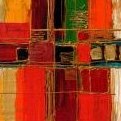
11.01.12 (Cheshvan 16, 5773) One of the great tests of our faith is to refuse to succumb to despair in the face of personal suffering. For those who struggle with chronic pain or some sort of overwhelming disease, the test of faith calls for the heart to look beyond the realm of appearance, where the "outward man" perishes, to the realm of ultimate healing, where the "inward man" is finally liberated from the ravages of sin and death.
Our present condition is one of a "divided house" that cannot stand. The old nature is earthbound, a creature of the dust of the earth, whereas our new nature comes from the breath of life imparted through faith in Jesus. In His infinite wisdom, God has imparted the treasure of hope in "jars of clay" so we can understand that our sufficiency comes from Him alone (Psalm 119:25; 2 Cor. 4:7).
זאת נֶחָמָתִי בְעָנְיִי כִּי אִמְרָתְךָ חִיָּתְנִי
zot · ne·cha·ma·ti · ve·o·ni / ki · im·ra·te·kha · chi·yat·ni

"This is my comfort in my affliction, that your promise gives me life"
(Psalm 119:50)

Our natural tendency is to seek comfort and to flee from pain. We fret over the insecurities of our world and instinctively seek shelter from threats we perceive. Yet the world itself is subject to vanity (Rom. 8:20); it is pain-riddled and constrained to ongoing bereavement: "All flesh is grass, and all its beauty is like the flower of the field" (Isa. 40:6). As Job said, "Life is but a breath" (Job 7:7).
God often uses suffering to do a "deep" work within us. Indeed, the tribulations of life are described using the image of the "squeezing of grapes," which yield something far more precious than any kind of this-worldly happiness. "For our light affliction, which is but for a moment, prepares us for a far more exceeding and eternal weight of glory" (2 Cor. 4:17).
Of course there are dark moments where pain can almost blind us to all hope. For those who know it, there are long hours where there seems no respite or consolation from affliction. But genuine faith affirms with Job that, "though He slay me, yet will I trust in Him" (Job 13:15). This is comfort we have in affliction: God's promise revives our hearts to say, "I know that my Redeemer lives, and at the last he will stand upon the earth" (Job 19:25). Even in the "shadow of the valley of death" (i.e., this moribund and broken world), the LORD is with us and comforts us with His Presence (Psalm 23:4).
"Just as we have borne the image of the man of dust, we shall also bear the image of the man of heaven" (1 Cor. 15:49).
 |
|























































































